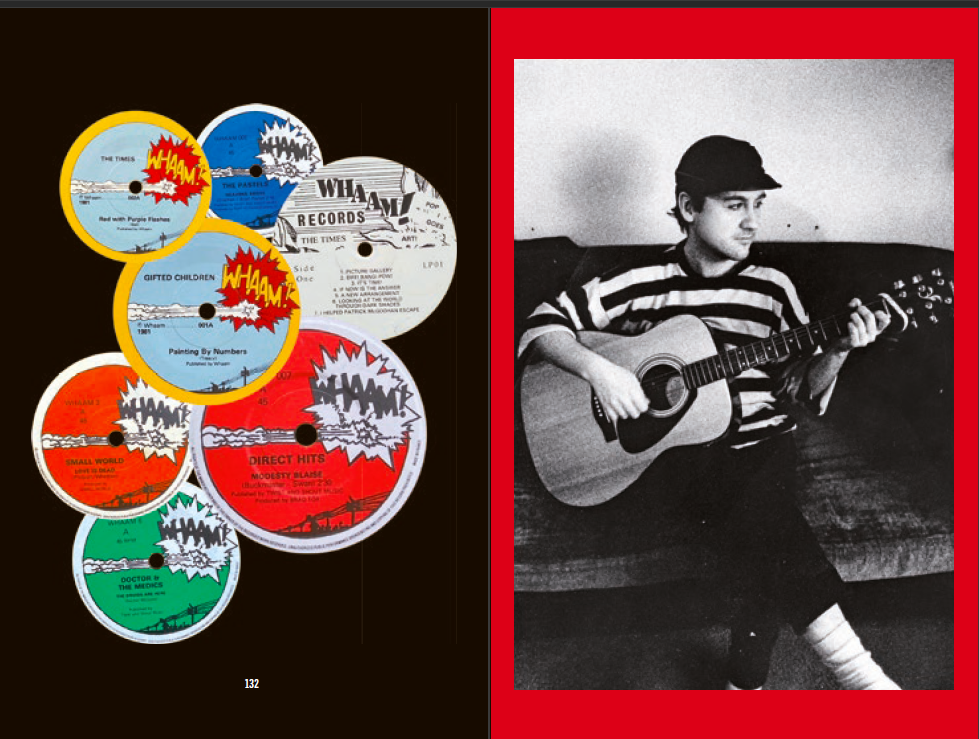Thanks to the New Yorker and Jay Ruttenberg for this! There is also a third event on Fri Oct 7 (see next post)
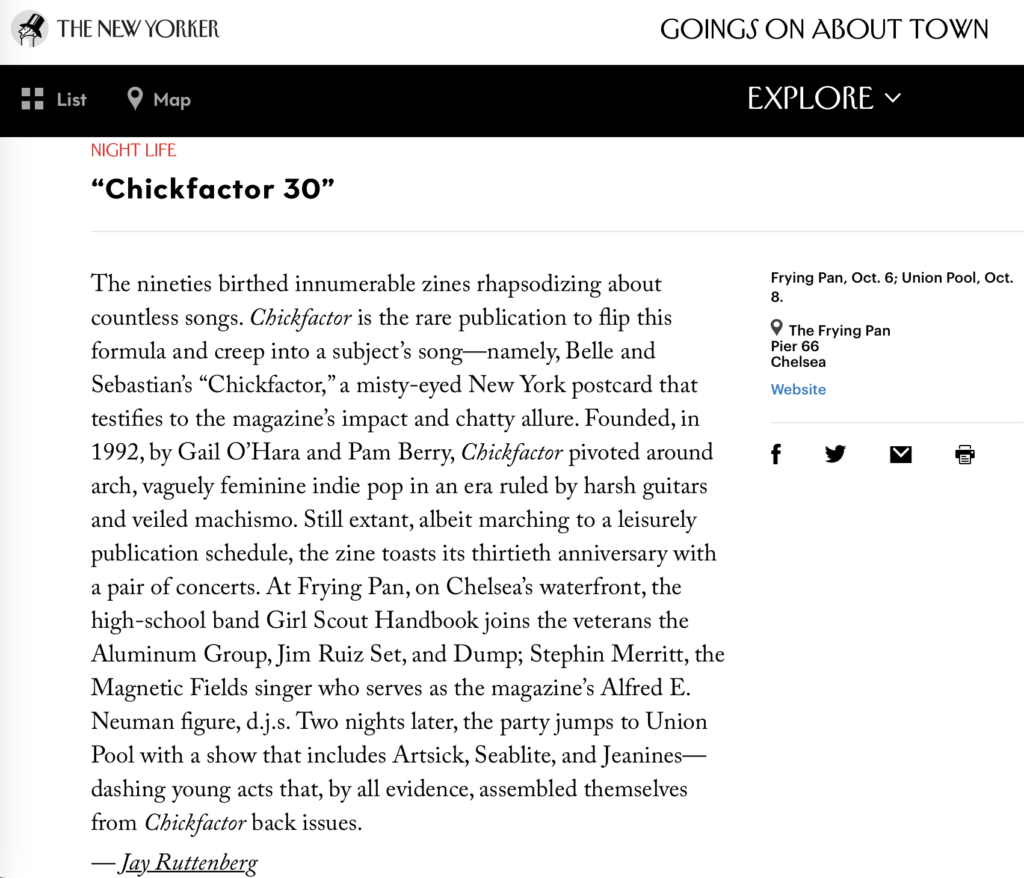
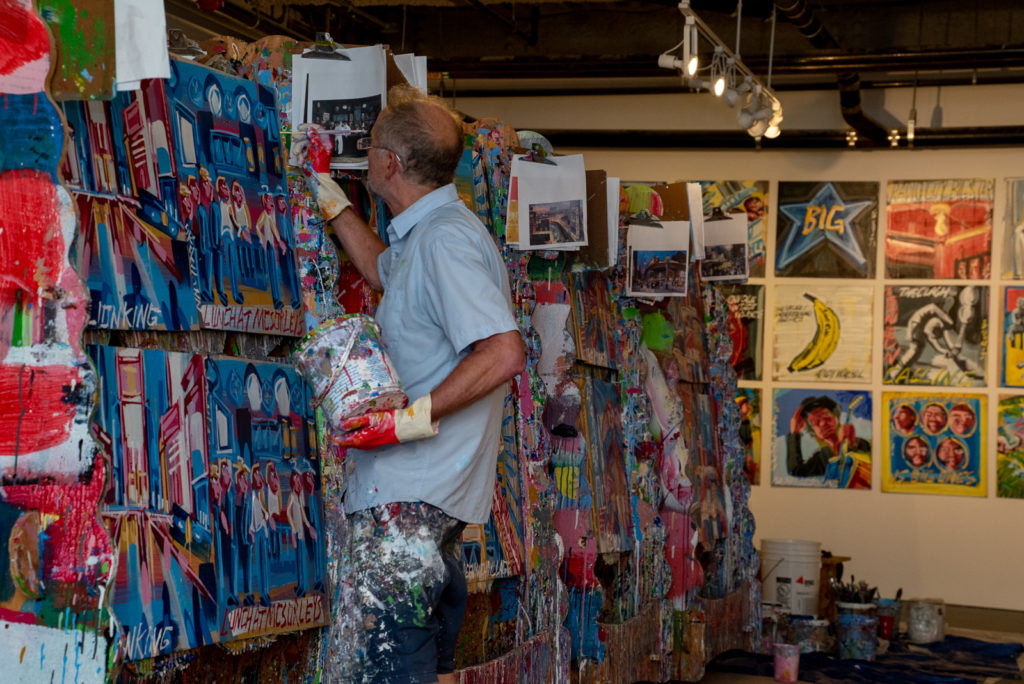
October 7 at 1 Brooklyn Bridge Park, 360 Furman St., 5pm to 7:30pm
Our third and final event in NYC will be at the Steve Keene Art Show, where Steve Keene will be painting (during the early bit) and signing copies of the book if you buy one! The STEVE KEENE ART BOOK came out earlier this year and CF’s Gail O edited the book. It was designed by Henry Owings from Chunklet and produced by Daniel Efram, who photographed and documented SK’s art for the book.
The British folk legend BRIDGET ST JOHN will play some songs
CF contributor and wonderful person SUKHDEV SANDHU will DJ
See you there!
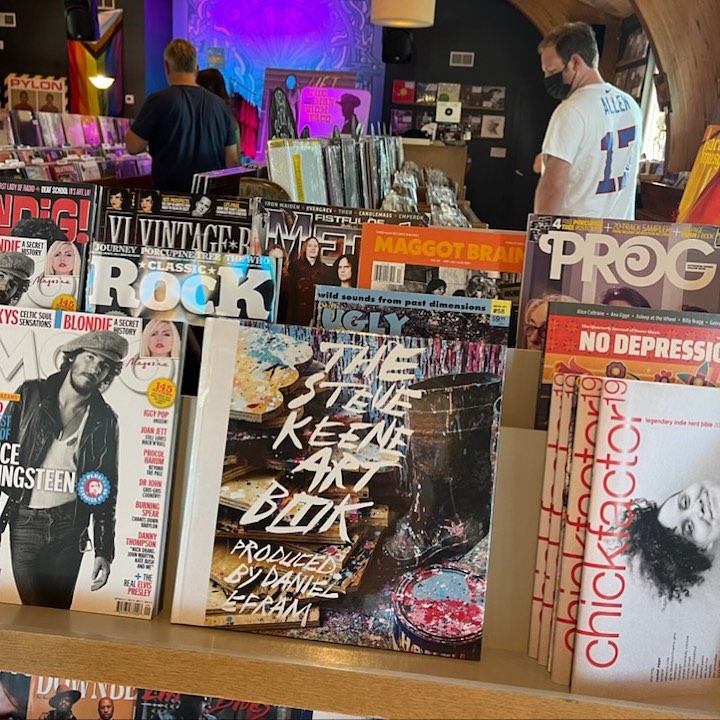
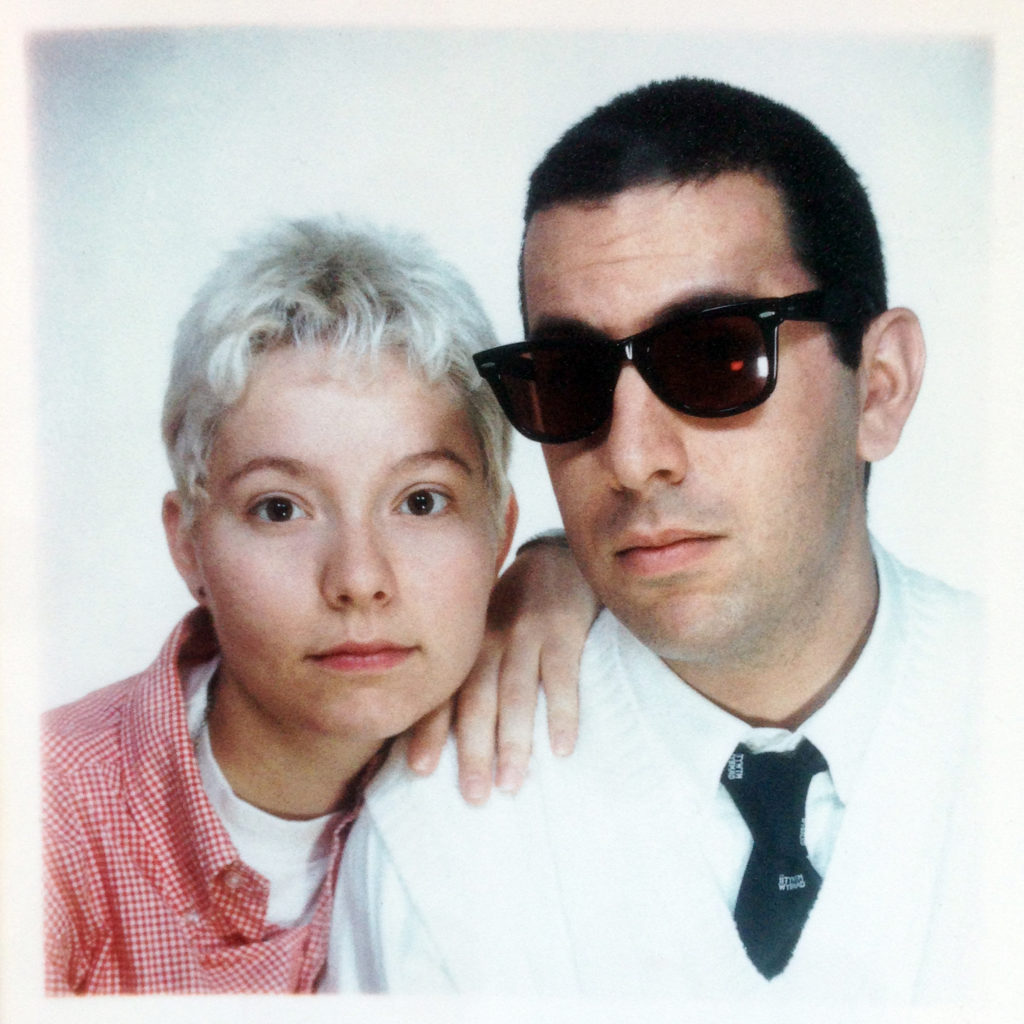
Coming from the land of Hal Hartley (uh, Long Island), My Favorite was/is a stylish, mod-ish punky pop band that formed in 1993, connected with us via zines and postcards, and played at some of our early shows in NYC. The band has existed in two time periods: 1993-2005, when (according to their Bandcamp) “teenage misfits gather around black mass of water called Lake Ronkonkama, release 7″s, release 2 LPs, go to Sweden, die.” Legend has it Michael Grace Jr. and Darren Amadio formed MF at SUNY Stony Brook, then added Andrea Vaughn, Gil Abad, and Todbot. The ’80s had just ended so it was an influence! They released their first cassette and a few seven-inches between 1993-1995, the latter on Harriet Records. They were quite active between that time and 2003, then called it quits and reemerged in 2014. (Grace was also in the Secret History as well.) We spoke with Michael on the eve of the first release in a series of three EPs via HHBTM and WIAIWYA. Interview by Gail / Images courtesy My Favorite
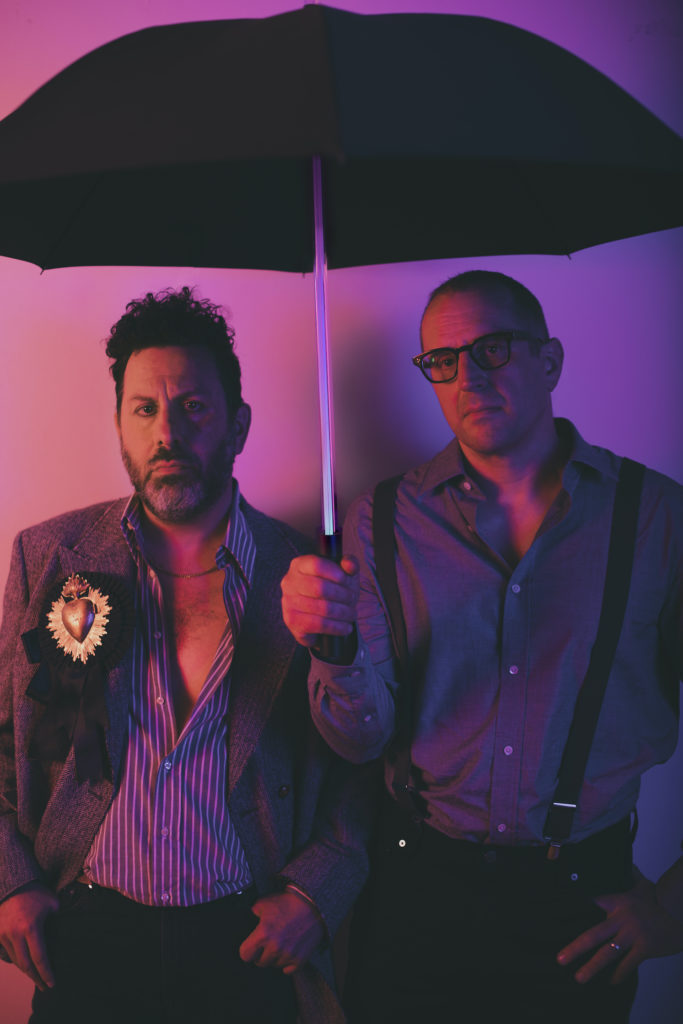
How are you holding up in the pandemic era?
I’m OK! Honestly the pandemic has been instructive in a sense. I was, and still am, worried for myself and my parents and my friends—COVID is serious stuff. But on a different level, the pandemic helped me realize just how isolated I had let myself become in the years prior to COVID. How comfortable I had gotten with my depression, and with being apart from so many things that used to bring me joy. Seeing people on social media freaking out about all the stuff they weren’t doing, all the stuff they were missing, it just shook me out of a certain complacency. Because things hadn’t really changed that much for me. So it encouraged me to take a hard look at my life and recommit to letting people in, to taking chances, to making my art. So seeing this first EP finally released, it means a lot to me. I’m still a bit battered and dazed, but I feel a little like Mad Max (Sad Max?!) emerging from a smoldering wasteland. Onwards!
What were you like as a child/teen? Was your family musical?
Gail! That’s a novella at least! I was a very awkward and introverted child, prone to daydreaming and getting lost in movies and books and drawing. I was sick a lot, and I didn’t really have many friends. My mother was insanely overprotective and her anxiety both affected and infected me. And those were the best years of my childhood! Becoming a teenager was much, much worse and that period was pitted with incidents of violence and abuse. All of that only pushed me further into my own inventions and fantasies. They became a kind of sanctuary to me. A haunted castle of self (Abandoned Castle of My Soul?!) You come to have a very complicated relationship with trauma when you start to believe that all your gifts have sprung from it. There is no My Favorite without all that darkness. But there was nearly no me, because of it. That takes a long time to sort out. ¶ Eventually music joined books and painting to really save me as a teen—and to help me find people whom I could feel seen by, and safe around. Perhaps that’s why I kept some of the spirit of that era with me in the music I made over the decades that followed. ¶ My grandfather on my mother’s side supposedly played violin, though I never saw or heard him play. He had a violin case, but I used to imagine that it was full of cash or secret ledgers. We were a Sicilian-American family in Queens, and the mythology of the mafia still remained during my early childhood. However, his son—my Uncle Joe—replaced Felix Pappalardi as the bassist in Mountain with Leslie West, and was a really great rock ‘n’ roll musician. He gave me my first guitar, but I couldn’t play it because I was left-handed. On my dad’s side were mainly cops.
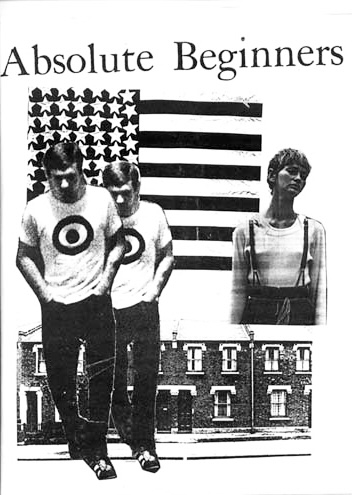
Tell us about the Long Island scene from your early days (zines, shows, etc.)
As a young teen, there was heavy metal and hardcore—so given those choices I opted for hardcore, but I wasn’t especially suited to it. I was the worst skateboarder in Lake Ronkonkoma. I did find our first drummer in a hardcore group and convinced him to join our 11th grade new wave band, which also included Darren Amadio, who went on to be my guitarist/musical partner for the next 20 years in My Favorite and The Secret History. Long Island was ahead of the curve in terms of radio stations and clubs though. WLIR was one of America’s first commercial stations dedicated to new wave (a decent documentary on it dropped a few years ago). Duran Duran used to fly into JFK, take a limousine out to Long Island to do an interview, and then straight back to play Madison Square Garden. WUSB—the college radio station in Stony Brook—was also great, especially Lister-Hewan Lowe’s reggae show called “Saturday’s A Party.” There were also dance clubs like Malibu and Spyze that were nearly on the level of places like Danceteria and Limelight. This was during my high school years, roughly 1987–1991. ¶ Once college started in the ’90s, it was really a mishmash of scenes and styles as indie and grunge came into prominence. But in the clubs—synthpop, industrial, and the new romantic stuff never really went away. We went to these little strip-mall goth clubs in the suburbs. It was laughable, but also sort of amazing. I listened to my fair share of Britpop—especially Suede, Blur, and Pulp. I was intrigued by techno and house but did not have the stamina necessary for raves. Still, I listened to stuff like 808 State, Future Sound of London, A Guy Called Gerald, and Mr. Fingers. I read the NME every week, but also started to send away for indie pop zines and follow labels like Teenbeat and K, and Kill Rock Stars. I wasn’t entirely sure about the music, but I loved the spirit. I found Riot Grrrl really inspiring. When I got Huggy Bear’s “Weaponry Listens To Love” LP, it really shook me, like an indie pop “Unknown Pleasures.” ¶ So there was really no organized indie pop scene on Long Island then. If we were on punk bills, we skewed our set a little heavy; if we were playing with synthpop or shoegaze bands we went that way. It worked for us. I wasn’t very committed to any sound or scene. I felt like we were doing something that created its own world. I know that sounds arrogant, but in a way—it proved true for many. ¶ There were a lot of zines on Long Island, mostly personal zines, and I did a big one-off with Andrea from MF called “Absolute Beginners,” which connected us to a myriad of people via the P.O. box. It was an innocent time, with the internet in its infancy, and the years peeled away slowly in the ’90s like a sunburn. Few cared about a weirdo pop band from Long Island, and we had no musical careerist aspirations at that time. So we went to school, worked some really menial jobs, and played whatever shows we could. At that time, it felt great to put out a 7” a year on these interesting little labels.
What was the indie pop scene like when you started out with MF and how did it change through the decades?
Our first single was “Go Kid Go” / “Absolute Beginners Again” in 1994, and then “The Informers” / “Detectives Of Suburbia” in 1995 on Harriet Records— which I was really excited to be on in no small part because of the Magnetic Fields single they had done. It also didn’t hurt that the label was named after my most beloved YA book, Harriet The Spy. In 1996 we did two split singles (“Working Class Jacket” and “Modulate”) and then spent nearly two years trying to make a record that wasn’t very indie pop at all. To be honest, I had been drawn to indie pop due to the leftist politics and “up with kids” energy of scenes and labels in the Pacific Northwest and D.C. Yet having our label run by a Harvard professor, we ended up in this little Northeast cabal of bands and small college shows. And it was, frankly, culture shock. We were legitimate working class and middle-class kids with Long Island accents. We all went to community colleges and state universities. Playing in Cambridge, at MIT, at Bryn Mawr, at Brown. It was wild. No amount of thrift store cardigans and barrettes could conceal a rich kid from us, and vice versa. We were treated as somewhat of a curiosity, playing decade-old synths and wearing the preppy clothes they had themselves self-consciously forgone. It was clear we were up to something with this soul boy/Benetton kid look. But what? It was some Fabulous Mr. Ripley shit and Brideshead wasn’t entirely having it. ¶ That said, I have some amazing memories of those years, especially mini-tours with Go Sailor and the Softies and Holiday and the Push Kings. But there were other nights we were playing with bands whose parents were famous right-wing Texan senators. I’m not saying this was that kid’s fault, but it was just a whole new world from the punk and goth scenes where we had started out on Long Island. A lot of wealth, and a lot of privilege. Occasionally it felt like we were in a kitschy bubble, and I really wanted to pop it. ¶ I also found the shambolic, half-trying aesthetic of some indie pop to reflect how little it all actually mattered to them. Like, was this just some sort of rumspringa before jobs in finance and summer houses in Cape Cod? By this point I really wanted to change pop the way my heroes did. But my depression and anxiety got deeper the more I failed to figure out where we belonged in all of this. We spent half a year doing demos for Minty Fresh, and when that didn’t amount to anything, we made the poor decision to max out our credit cards trying to make a slick, retro-sounding record that would be defiantly anti-grunge and anti-lofi. ¶ The biggest change in the indie scene for us came around the year 2000. The Love at Absolute Zero LP came out in 1999, and while it might have been polarizing, it was also quite acclaimed in certain circles, and solidified our fan base. Then when electroclash started, we had a second scene to not really fit into, but one in which we had some simpatico and overlap. Then with the emergence of the Strokes and the explosion of interest in NYC bands, we were able to hold our own in that scene, as we were a group with both post-punk and art rock influences. We actually headlined a CMJ show at Brownies in the early aughts that featured both the Walkmen and Interpol in probably their first years of existence. Though I continued to live a mainly monk-like existence, I did find the glamour and sleaze of these years exciting on a Warholian level. So between indie pop, electroclash, and the next wave NYC scene we had fashioned a kind of praxis, a Venn diagram for being My Favorite. Those were the best years, and I think it’s reflected in the songs we wrote during them.
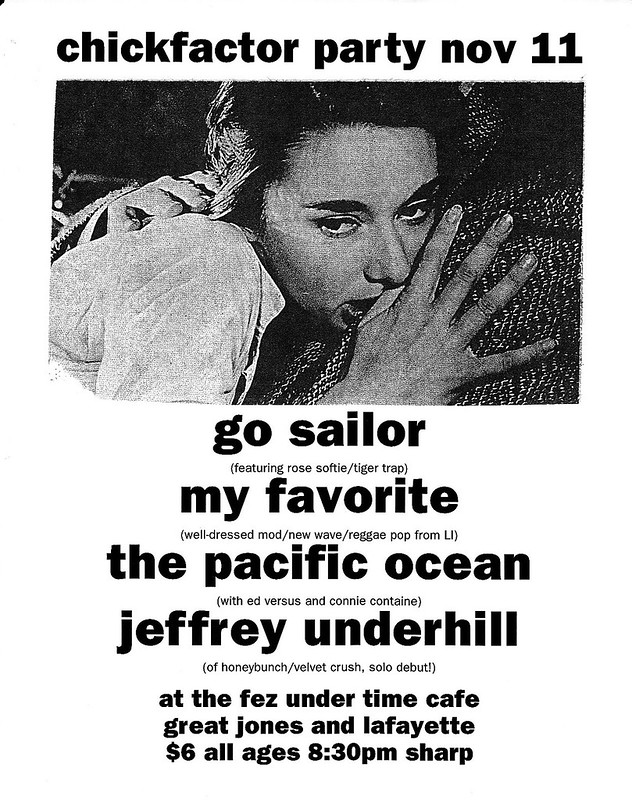
You played at a number of chickfactor things back in the day. Any memories or connections made at those?
My main memory of chickfactor was how it helped me learn about and get deeper into bands like Belle & Sebastian and the Magnetic Fields (that and being slagged off by Sleater-Kinney in the Jukebox Jury thing). So then to end up being able to eventually play with both those bands and have friendships with certain members (we actually talked Claudia Gonson into managing us for like three months), it was really special. I also remember being exposed to Momus and Nick Drake through chickfactor. I had a real appreciation for the lens through which your crew saw indie. There was just a really high curatorial quality, and whenever we were able to play a CF party or show it was a real thrill.
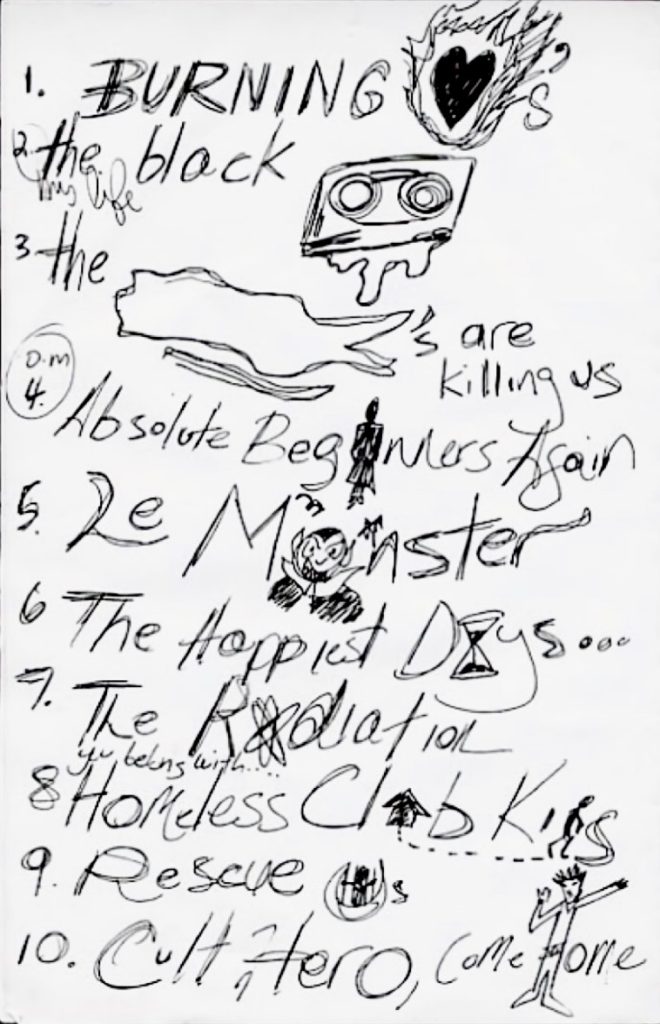
Do you see it as having a political side to it? Your band always seemed to.
It, as in indie pop? I think it could have and should have had an even more political side to it. Considering how important Riot Grrrl was to the formative years of the scene, I think it is disappointing that it didn’t. But I’ve touched upon some of the reasons it may not have. I remember a popular indie pop zine writer who was vocally pro–George W. Bush, and some of the uncomfortable silences that would follow when I challenged him. The vibe was that it was rude of me to take shots at this “nice, harmless bookish guy.” It drove me crazy. And now look where we are! I’m not saying that artists need to write political songs—they are very hard to do well. I had a few like “Working Class Jacket,” “Detectives of Suburbia,” and “The Informers,” but overall, that wasn’t my focus in any didactic way. I tried to write about life, and by doing that I think this dystopia of late capitalism emerged in our songs. However, I always thought that a band should, in their art and interviews and personas make it very clear where they stood. I really admired artists like Billy Bragg and Heaven 17 and the Style Council for doing that. If I couldn’t be in a band that talked about kicking fascists in the balls, I didn’t want to be in one at all.
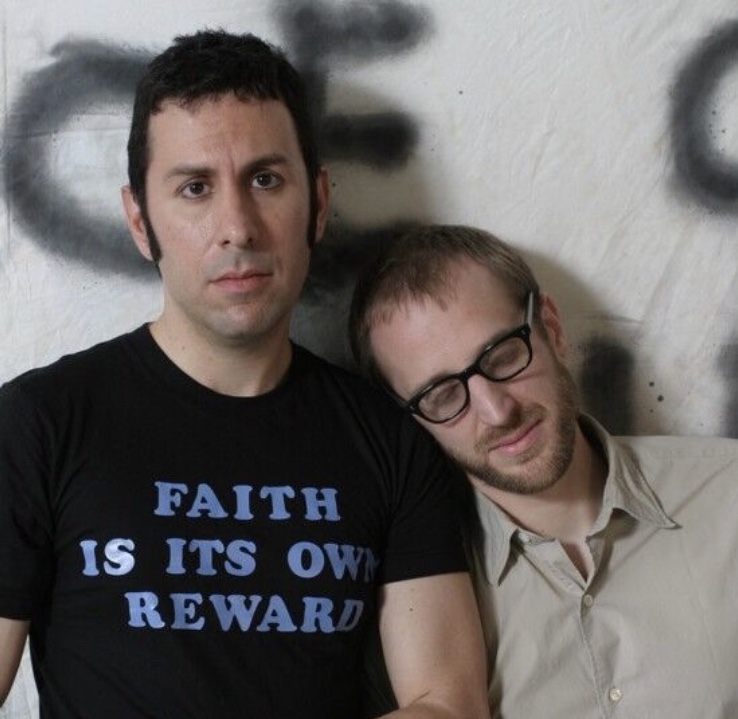
How do we save this country from evil (and idiocy)?
I’m really not sure, but it is clear we have to! I think for now, we support and protect all the people the Right wants to erase or harm, and we stay vocal and vigilant about how much peril we are in. Voting is part of it, but it’s also about solidarity. It’s about pushing back at the insane narratives that are poisoning our country. It’s also about expecting more from Democrats in an intelligent and strategic way. We are getting outschemed by Nazis. We just have to keep fighting and not get demoralized, no matter how bad it gets. We need as much Socialism as we can get this Nation to swallow.
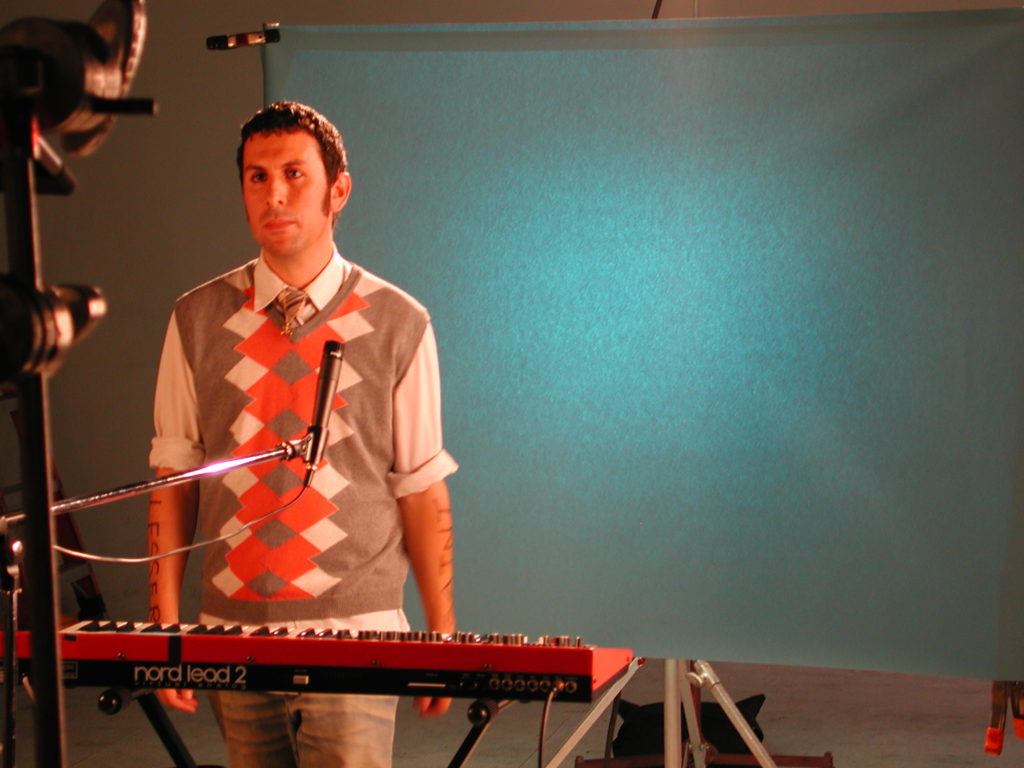
You guys seemed to have a very ’80s and very mod style back then. What were some of the things you were into then?
Yeah, like I mentioned before, Long Island was really the center of New Wave radio and culture on the East Coast via WLIR, Malibu, My Father’s Place, etc. I was just a kid in the ’80s but I do think some of that culture rubbed off on me. Seeing the punks, mods, and new wavers on the bus, and in the park. They seemed like Star Wars characters to me. These fantastical others that I wanted to know, and eventually—be. At around the age of 14 I experienced certain trauma, and after that I had less desire than ever to “be normal.” So these “freaks” became like saints to me. By the time the ’90s arrived, I was really intent on reclaiming that feeling and (hopefully) reimagining it into something new. As grunge emerged, I gravitated toward the mod/skinhead thing mostly to be contrary. The irony was that I was too poor and too ethnic to be accepted by the preps in the ’80s, but in the ’90s, in the context of a band, I could appropriate that look and try to make it my own. It was my way of saying “I am my own gatekeeper now.” Or actually, my own gatecrasher. I related to the original mods—working class kids who subverted Savile Row, subverted the “respectability” of the middle class, and became an unsettling mirror of it. Like a double agent. That’s what I was trying to do. So I blended ’80s prep/Ivy League (a lot of which you could get cheap in thrift stores as it was no longer trendy during grunge) with skinhead style and a sort of Italian mod thing, like how Marcello Mastroianni or Pasolini dressed. And honestly—I still dress the same way to this day.
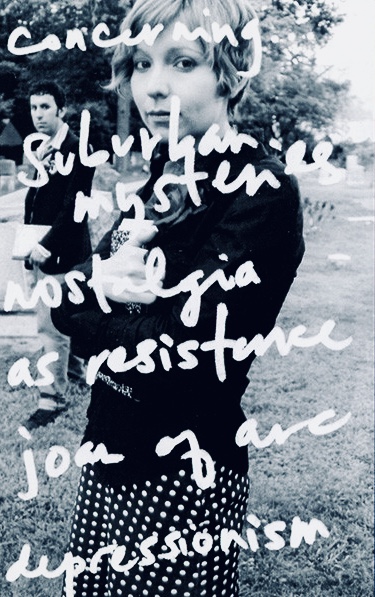
Who are your style icons?
Aside from the folks I just mentioned—Paul Weller in the Style Council, just fantastic looks one after another. Andy Warhol in the ’70s, with all the tweed and corduroy blazers and school ties and paint-splattered jeans. Jean-Michel Basquiat in the ’80s, making Ivy League look worn and weary in this slyly confrontational way. Lou Reed for just being so immutably “New York.” Bryan Ferry in his rich and bored phase. And of course David Bowie—especially during the period after Ziggy. The apocalyptic soul boy of “Young Americans” and “The Man Who Fell to Earth.” I’m also a fan of Vivienne Westwood and Alexander McQueen, though I tend to blend in their influence subtly. Let’s see, who else—James Dean. Marvin Gaye. Peter Murphy and Mick Karn in Dali’s Car. Agent Cooper.
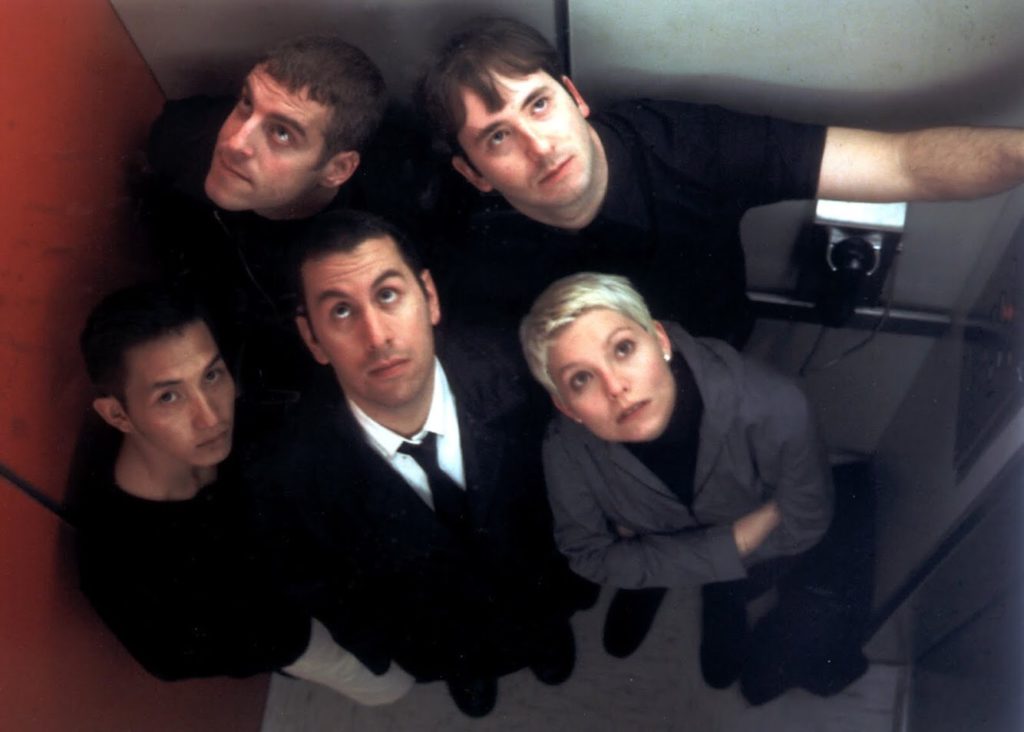
How would you describe your own personal style?
I’ve touched on a lot of it already. I’ve always been interested in taking style cues from scenes and circles I never had access to—like Ivy League and European couture and juxtaposing it with suburban and urban street styles. I like to mix in odd things like aristocratic British bog-wear lol—Barbour field coats, plaid caps and black rubber rain loafers. I like to make playful nods at my Sicilian heritage by wearing gold chains and saint medallions. I also love skinhead style and the ’80s/’90s “casuals” look—Burberry macs, Fila and Lacoste, khakis and soccer jerseys. I like to have fun and be ironic and give people a sense that something is just—off. It’s all a kind of performance art to me. Like “Who let this person into our club?” The answer is I let myself in, hit the buffet, scrawled “My Favorite Forever” on the bathroom mirror, and got the fuck out. ¶ I usually dress like an ’80s burnout or beach bum when I’m just hanging out. Especially in the summer. Weird t-shirts and cutoff jeans and sunglasses. Sneakers with holes in them.

As someone who seems as big a Smiths fan as I was, how does it feel listening to their music now that we know what kind of person Morrissey is? He’s definitely a complicated character.
It is absolutely one of the strangest and most disenchanting experiences of my life to watch someone who was so important to me in my late teens/early twenties start to fall from grace and just keep falling. There isn’t a thing he says or creates now that contains anything of value. It’s just grievance and narcissism. And it’s gross. He is a deeply reactionary figure, and all he does for me now is serve as a reminder to be vigilant as you get older. Of your biases. Of your blind spots. I don’t even want to give him any more oxygen than that. But at least we still have Johnny.
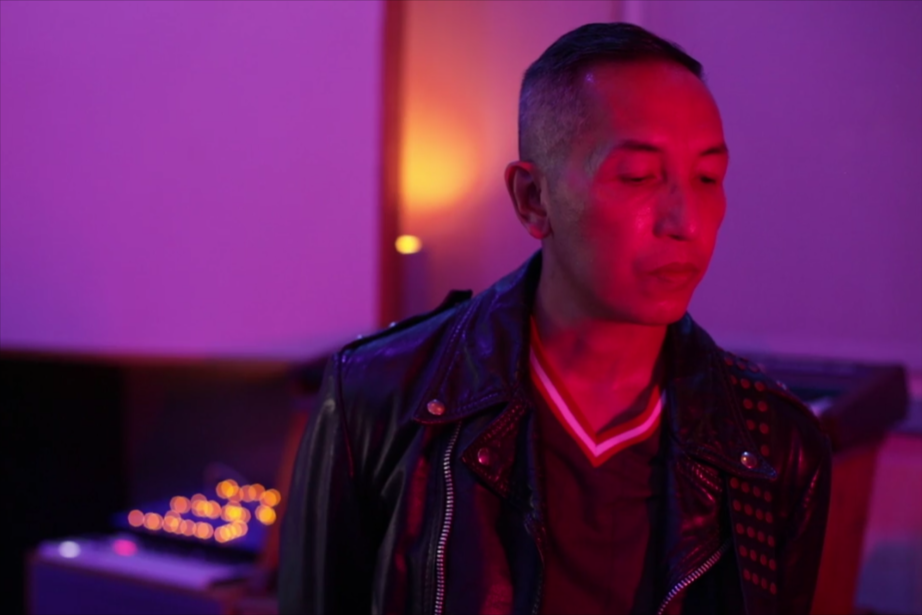
I feel like “miserablism” was a sort of goth, sort of nerdcore movement that never got explored as a thing.
I think you are probably right, but maybe that’s a good thing? Even as someone who has suffered from serious depression for most of his life, I wouldn’t want to be known as an artist who glamorized or commodified that sort of darkness. The world is still imbued with beauty, and each being has value, and none of us was created to suffer. I know my songs deal a lot with shadowy thoughts and feelings, but that’s not all they deal with. I believe in love and I believe we can heal—and help others to.
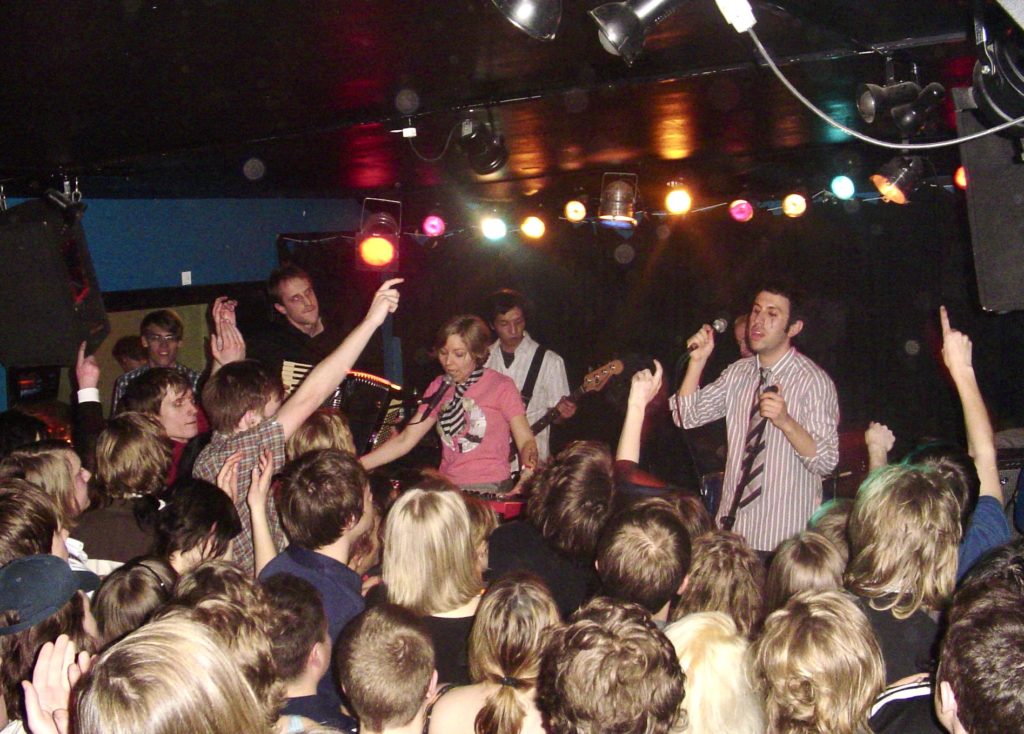
Why do you think My Favorite were big in Sweden?
Well, the boring answer is that one particular magazine and one particular national radio show in Sweden were very influential, and both of them championed us ruthlessly. But why did they? I think that’s the more interesting part of the answer. I’m not really sure. I think I have a certain respect for melody and rhythm, two classical attributes of pop that I think Swedes have a taste for. I also think that despite us using so many European reference points in our music, there was also something brash and reckless about us that owed more to America. Judging by the quasi-riotous crowds we’d draw in places like Gothenburg, I think the Swedish fans tapped into that. Understood that we were some really fucked-up kids, that it wasn’t a put on. I think that quiet storm of feeling in our music felt liberating to them. They tore off the plastic wrap, where other people couldn’t see past their own reflections in it.
What was the first record you bought?
I think it may have been Judas Priest’s Defenders of The Faith. Satanic Panic was a big thing on Long Island in the early ’80s and I was a textbook case of a 12-year-old really into the devil. At least in a Dungeons & Dragons way.
What was your first gig?
Hmmm, I think it was INXS!
Tour horror stories?
Gratefully, we haven’t been robbed or left stranded somewhere. But one time in Norway I remember our rental van getting grazed by a trolley car as we were hurtling the wrong way down a cobblestone street, and we were really close to colliding with it head on and being killed in a ball of fire.
What are some of the weirdest events you ever played?
In 1994 we played a DIY event called Vulvapalooza at the old Gas Station—the illegal East Village venue where GG Allin died. We sounded like OMD, and the punks and Riot Grrrls were just shaking their heads. We were four boys and Andrea. After we played, a young woman with like 11 safety pins through her face came up to me and simply said, “One vulva was not enough vulvas to play Vulvapoolaza.”
Who is your favorite lyricist ever and why?
Oh, that’s really hard. There are so many good ones. It’s pretentious to say that I was more influenced by certain writers and poets like Sylvia Plath or—God help me—Bret Easton Ellis, but in my earliest years that was probably true. So instead of discussing the pantheon let me give credit to a couple underrated people. Brett Anderson from Suede had a very distinctive lyrical style. He’s like a pop art vending machine full of apocalyptic pulp sci-fi novels. I remember being really into that. And Bernard Sumner is one of the best “bad lyricists” ever. There is something so awkward and artless about his lyrics, but like—they work, and his imagery feels uniquely idiosyncratic. When is “Blue Monday”? Who are the “Thieves Like Us”? What is “The Perfect Kiss”? I mean, no one wants me to wax on about Donald Fagen or Lou Reed in Chickfactor. (sure we do.—editor)
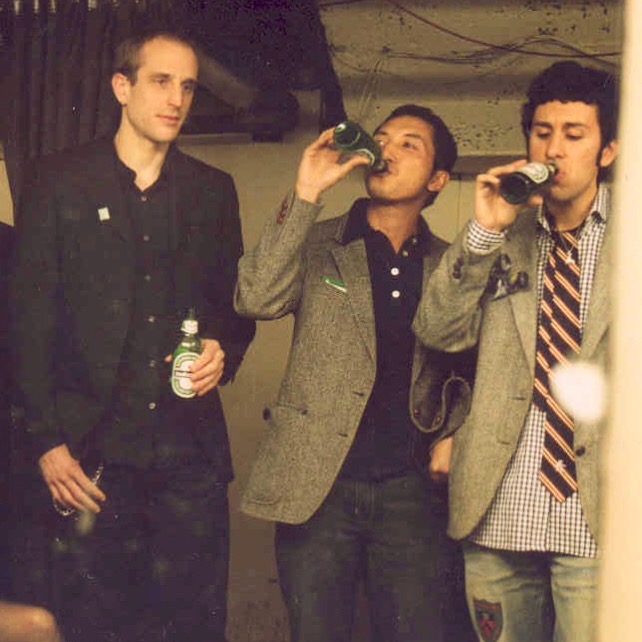
Do you have pets, kids, hobbies, a day job? Tell us more.
I do not have any pets or kids, though I love being an uncle to my amazing five-year-old niece Franny. She is literally my best friend. I think I’m too intense and crazy to have any “hobbies.” Everything I do I get really into, even if it is hitting golf balls at the local dilapidated driving range. I guess watching YouTube videos about every nerdy thing on earth would be my main hobby. Like “Who Was More Powerful: Gandalf or Darth Vader?” I’m not proud of it. I watch a decent amount of baseball and soccer. I have a couple day jobs but being a part-time art professor at the local community college is the one I enjoy the most. I’m working on a trilogy of YA novels set in the My Favorite Extended Cinematic Universe, but I don’t consider that a hobby—more a burden.
What are you reading, watching, listening to, cooking?
Fiction-wise I’ve been reading On Earth We’re Briefly Gorgeous by Ocean Vuong, and re-reading On Rockaway by Jill Eisenstadt. Nonfiction, I’ve been crawling through Sweet Dreams, a long oral history of the New Romantics. I watch way too much TV. I mean, I’m still watching Westworld long after most replicants jumped ship. I’m most excited for the upcoming final season of Atlanta. I’ve been listening to a lot of stuff—old and new—but Miserable Chillers, Swan Lingo, Holy Wire, and Scam Avenue have all released amazing music over the last few years. Cooking? I’m always trying to re-create my grandmother’s pasta dishes from my youth. Sicilian stuff with fried zucchini and red pepper flakes, Parmigiano Reggiano, fennel and sardines and the like.
What are some of your favorite records in 2022?
Kristeen Young’s The Beauty Shop. Drake’s Honestly, Nevermind.
What song is currently stuck in your head?
“To Turn You On,” by Roxy Music, but that’s because I just saw them at Madison Square Garden last night. The first arena show I’ve been to in maybe ten years. Bryan Ferry’s voice isn’t what it once was, but I had chills the entire show nonetheless. Beautiful.
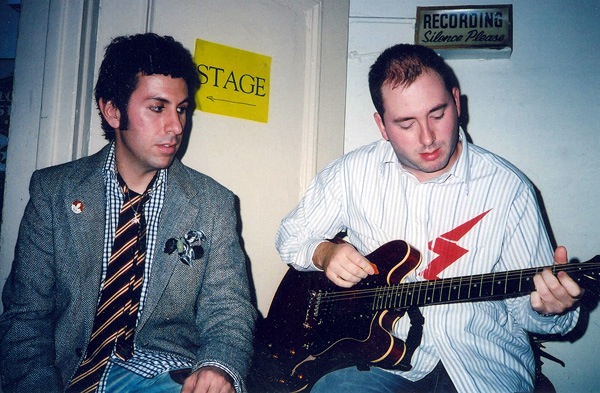
Tell us about the EP.
Tender Is the Nightshift: Part 1 is the first in a 3-EP series, and it is a return to My Favorite 17 years later with a skeleton crew of bandmates and a lot of machines and wires. It’s like returning to the city of your youth and finding it a rainy, neon-lit ghetto of ghosts. Which I am aware is pretty much the plot of Blade Runner. It’s a much more dancey/layered and synthetic soul record than anything we’ve done before. A luxury depression product. Or perhaps—a cheap knockoff of a luxury depression product. In all seriousness, doing this now feels like being in the after-hours of your youth. Some sleek steel and glass limbo with a hefty check that is soon to come due. I’m not sure what else to say about it except that we are still doing things in indie pop that others can’t or won’t. We have new stories to tell, and new vantage points from which to tell them, otherwise we wouldn’t bother at all. I have little interest in nostalgia, except as black magic. Anyway Kurt Brondo, Gil Abad and I are very excited and gratified to remake/remodel My Favorite this way. Give a listen!
What are your future plans?
Well, we have to finish these last two EPs, and there are songs on there that I can’t wait for people to hear. I’m going to try to get my YA published. I’d really like to travel again for the first time in a good while. And I’d love to play live, and we are working toward that. To be honest, I’ve been in survival mode for so long that the future is a really intangible concept to me. Yet—I always seem to find myself there.
10 records Michael cannot live without
You have to give me 15 otherwise I’ll have a panic attack. Also I’m not including The Smiths on principle right now—but they belong here. Lists are really difficult for me, but these have really been on my mind and turntable during the making of this EP series. OK! Not (necessarily) in order:
David Bowie, The Rise and Fall of Ziggy Stardust & The Spiders from Mars
Cocteau Twins, Heaven or Las Vegas
Lou Reed, Take No Prisoners
Marvin Gaye, In Our Lifetime?
New Order, Substance
Roxy Music, Stranded
Sade, Diamond Life
The Style Council, Confessions of a Pop Group
Donald Fagen, The Nightfly
Patti Smith, Horses
Prefab Sprout, Protest Songs
Destroyer, Kaputt
Dexy’s Midnight Runners, Don’t Stand Me Down
Frankie Goes To Hollywood, Welcome To The Pleasuredome
Macintosh Plus, Floral Shoppe
CHICKFACTOR 30
chickfactor fanzine was founded 30 years ago by Pam Berry & Gail O’Hara (in DC/NY) and we are incredibly excited to celebrate with you on October 28 & 29 at the Lexington and October 30 (afternoon) at the Betsey Trotwood. Cannot wait to see everyone and see these wonderful bands play! (Our 30th-anniversary issue is out now too and 5/6 of these bands are in it.) Presented in cahoots with the Hangover Lounge folks.
Fri. October 28:
Sacred Paws
Artsick
Rachel Love
Get tickets
Sat. October 29:
The Umbrellas
Birdie
Seablite
Get tickets
Sun. October 30: Daytime event (Noon to 4!)
Hangover Lounge at the Betsey Trotwood
The Catenary Wires
& Special Guests
Get tickets
—
Fri. Oct. 29: Doors 7pm, show 7:30
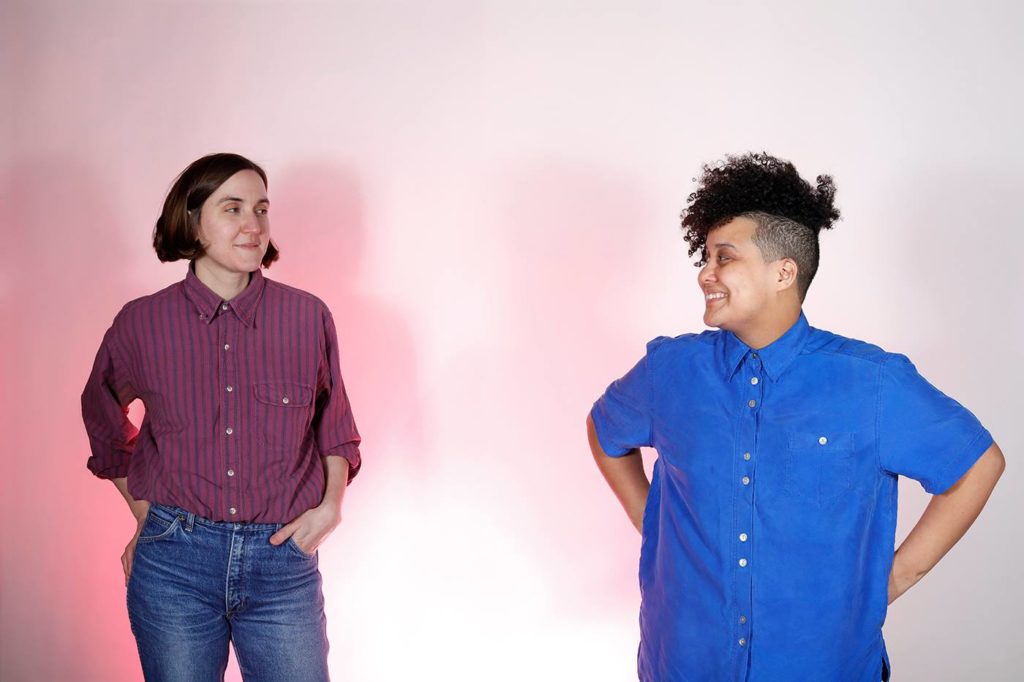
Sacred Paws (from Glasgow!) have a natural inclination not to take things too seriously. You can hear it all the way through a conversation with its two members, guitarist Rachel Aggs and drummer Eilidh Rodgers, punctuated by rolls of giggles and thoughtful pauses, and you can hear it in the light touch they bring to their music, a jangly blend of indie pop full of fizzing world rhythms and bright horns. Shimmering guitar riffs dance between snappy beats and swooning melodies that will have crowds committing to far more than a simple head-bob. “I think we’d get bored if it was too slow,” Eilidh says. “We’d never want to play something live that people couldn’t dance to. It would feel really strange to us. It’s kind of the whole point.” Joining them at this show will be Jack Mellin on guitar and Moema Meade on bass!
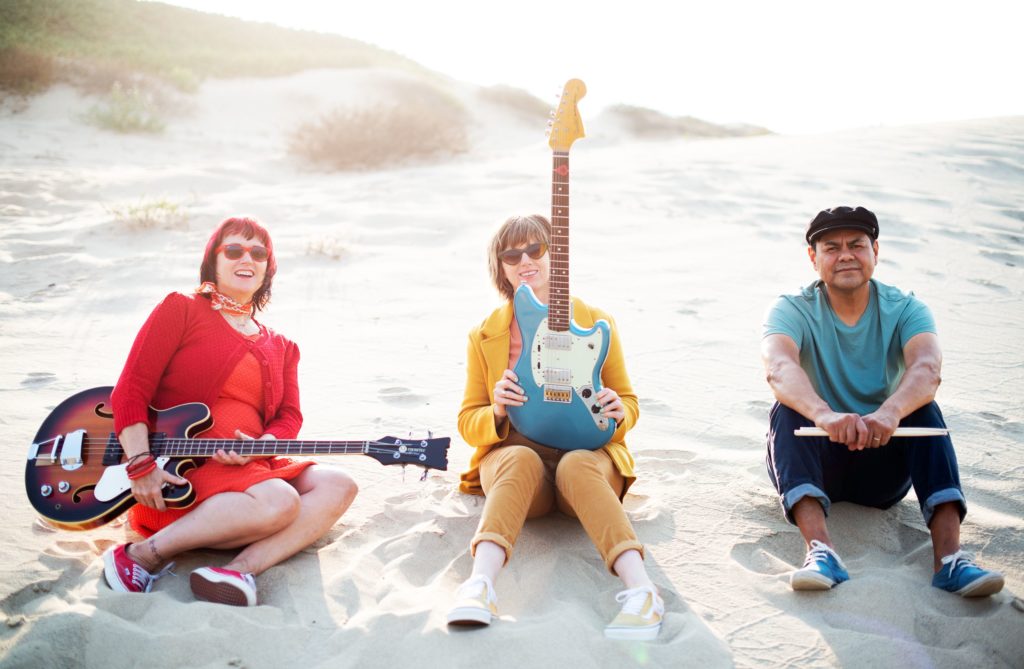
Artsick
London debut! Artsick is an indiepop band from Oakland/Seaside, California, consisting of Christina Riley (Burnt Palms/Boyracer) on guitar and vocals, Mario Hernandez (Kids On A Crime Spree, Ciao Bella) on drums and Donna McKean (Lunchbox/Hard Left) on bass. They formed in 2018 and released a 7-inch single, followed by their debut album Fingers Crossed, on Slumberland Records.
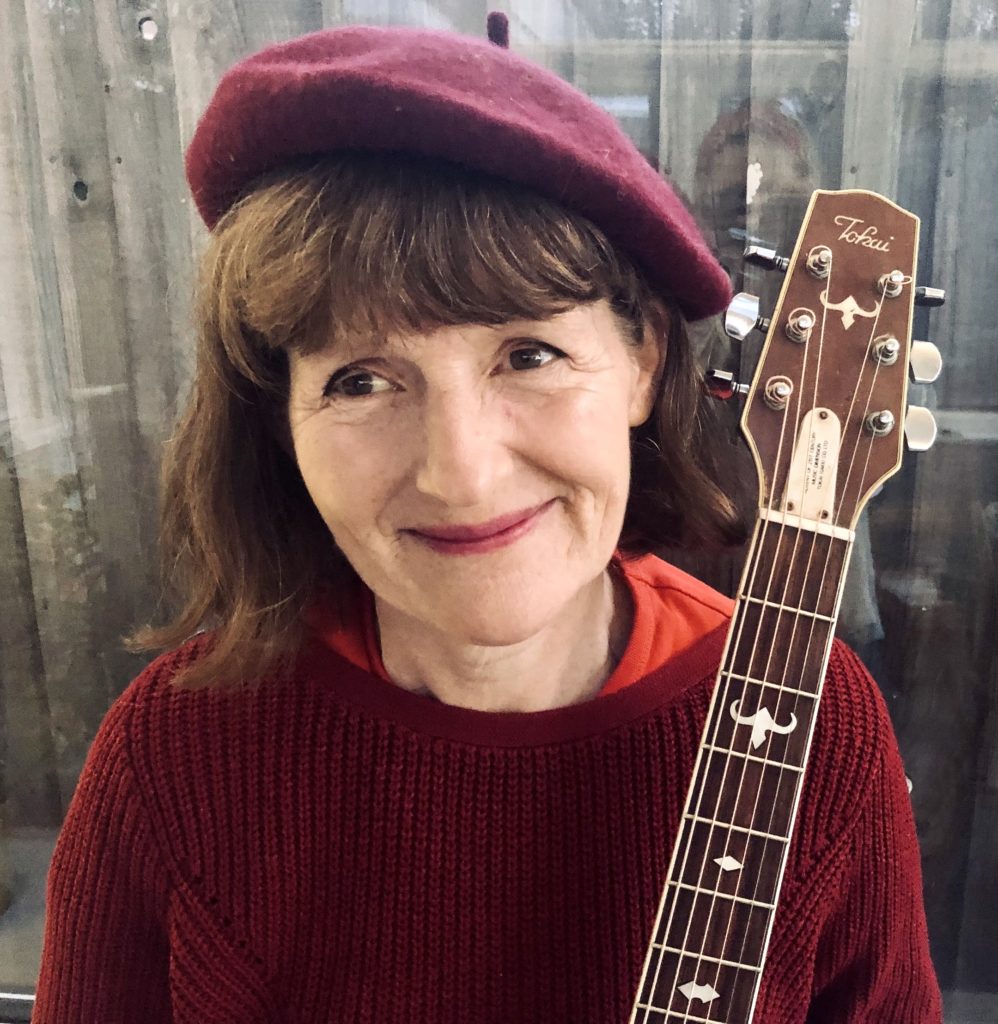
Rachel Love
Rachel was guitarist and singer in the seminal 70/80s band Dolly Mixture who were signed to Paul Weller’s Respond label and championed by The Undertones & John Peel. She was the singer in the band Spelt and has released her first solo album, Picture in Mind, in 2021. Also half of the Light Music Company.
—
Sat. Oct. 29: Doors 7 p.m., show 7:30
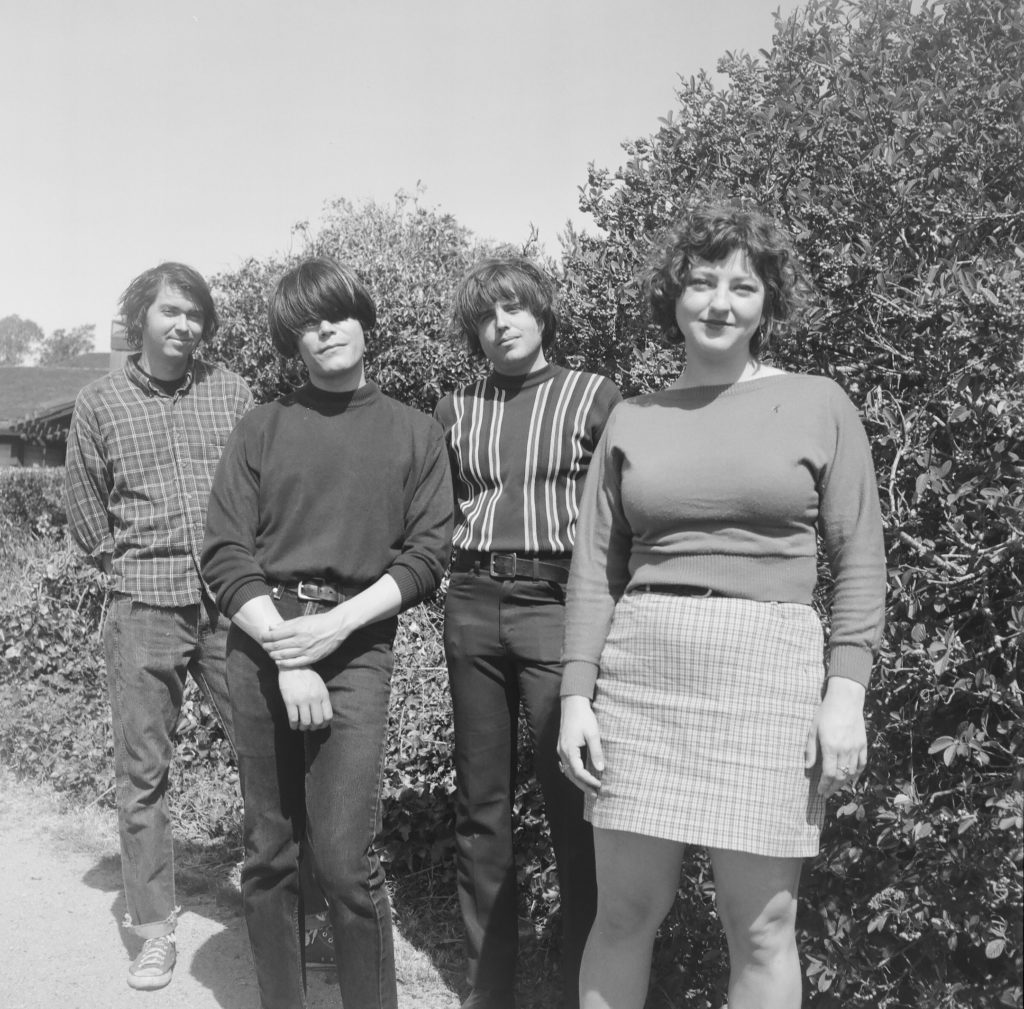
The Umbrellas
London debut! “The Umbrellas are one of the most exciting bands to come from the indiepop underground in ages. Bursting out of the SF Bay Area’s fertile indie scene, The Umbrellas come correct with a sound that fits snugly into a long line of classic pop, from The Byrds to Orange Juice, The Pastels, Comet Gain, Veronica Falls and Belle & Sebastian, along with a noticeable garage-pop/Paisley Underground flavor that is a hallmark of San Francisco’s best bands. Their self-titled 2021 debut album dazzled with a dozen perfect pop tunes, charming the indiepop faithful but also winning fans outside the scene, leading to sold-out tours with bands as disparate as Ceremony and Destroy Boys.” (—Mike Schulman) New Releases – ‘Write it in the Sky’ 7″ released via Slumberland, Meritorio, Tear Jerk, and Fastcut records.
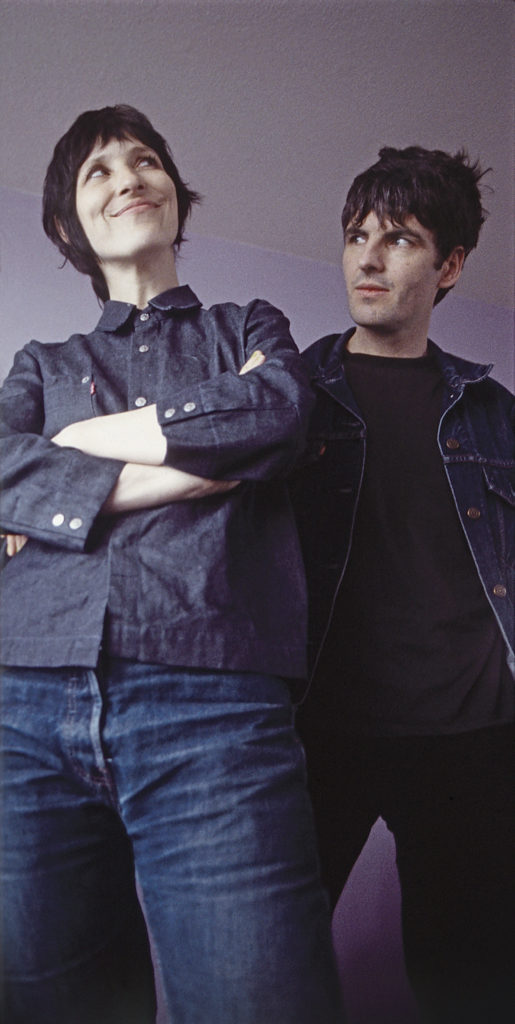
Birdie
Debsey Wykes (Dolly Mixture, Saint Etienne) and Paul Kelly (East Village, Saint Etienne) decided to form a group together while they were members of SAINT ETIENNE’s backing band in 1994. For two years, Debsey (backing singer) and Paul (guitar) toured Europe, Japan, America and played most of the major European festivals until SAINT ETIENNE took a break and BIRDIE was born. For this show, it will be: Debsey (bass and vocal); Paul (guitar and vocal); Jon (drums); Patrick (guitar or piano) and possibly Sean (piano)!
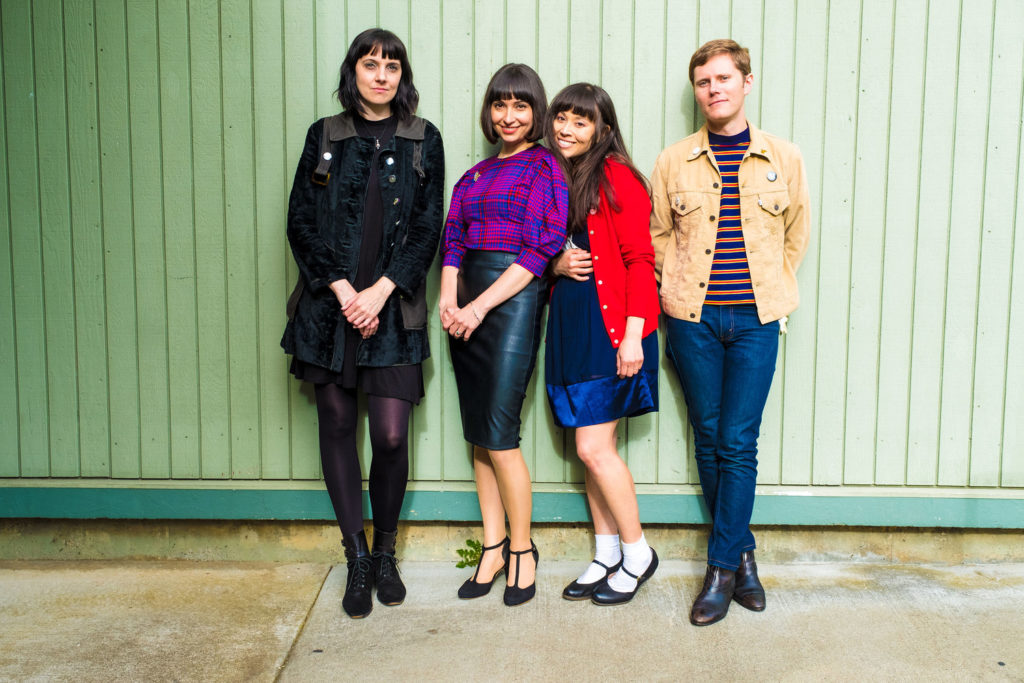
Seablite
London debut! Seablite is a four-piece pop band from San Francisco inspired by 80s/90s indie and shoegaze. In June 2019, Seablite’s LP debut, Grass Stains and Novocaine was released by Emotional Response, garnering domestic and international praise. They’ve since released a 10″ EP, High-Rise Mannequins (2020) and most recently their new single, Breadcrumbs c/w Ink Bleeds (2022). Seablite are back in the studio recording their sophomore LP and looking forward to what the upcoming year will bring.
—
Sun. October 30: CF30/Hangover Lounge at the Betsey Trotwood
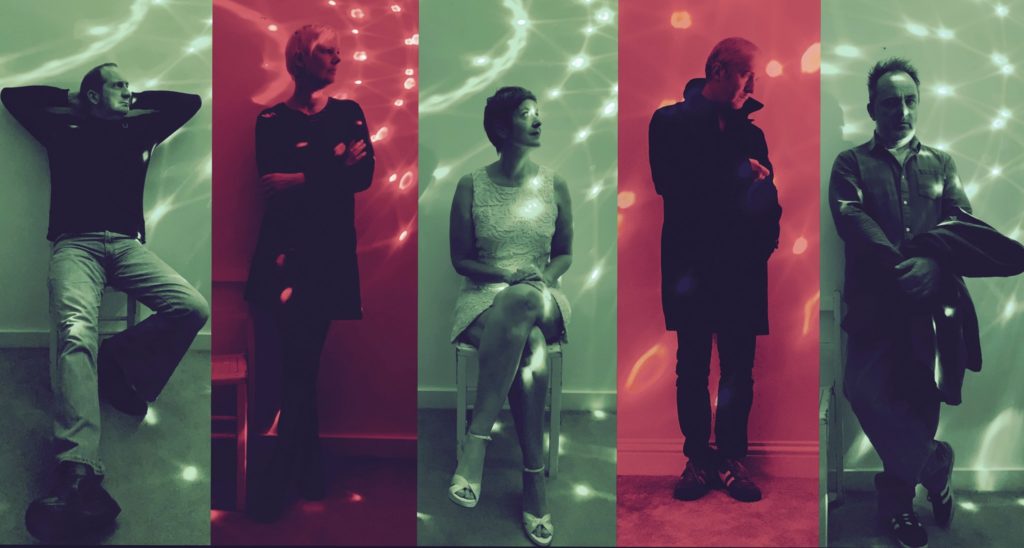
The Catenary Wires
& Special guests
& Hangover Lounge DJs
Formed by Amelia Fletcher and Rob Pursey (of Talulah Gosh, Heavenly, Marine Research and so many more!), Catenary Wires also feature Fay Hallam, Andy Lewis and Ian Button. Today will be Amelia and Rob as a duo. Their Birling Gap LP released June 2021 on Skep Wax and Shelflife (USA). Super early show! Noon to 4pm event. The show is technically sold out but we hope to be able to release more tickets.
chickfactor fanzine was founded 30 years ago by Pam Berry & Gail O’Hara (in DC/NY) and we are celebrating by having some parties in New York! We are so excited to have a friend-reunion and see all these rad bands play!
October 6 at the Frying Pan
The Aluminum Group
Jim Ruiz Set
Dump
Girl Scout Handbook
+ DJs Stephin Merritt & Gaylord Fields
Vegan options in the restaurant, nautical photo ops and portraits and other fun stuff!
Get tickets
October 8 at Union Pool
Seablite
Artsick
Jeanines
Gary Olson
Get tickets
Thurs. Oct. 6:
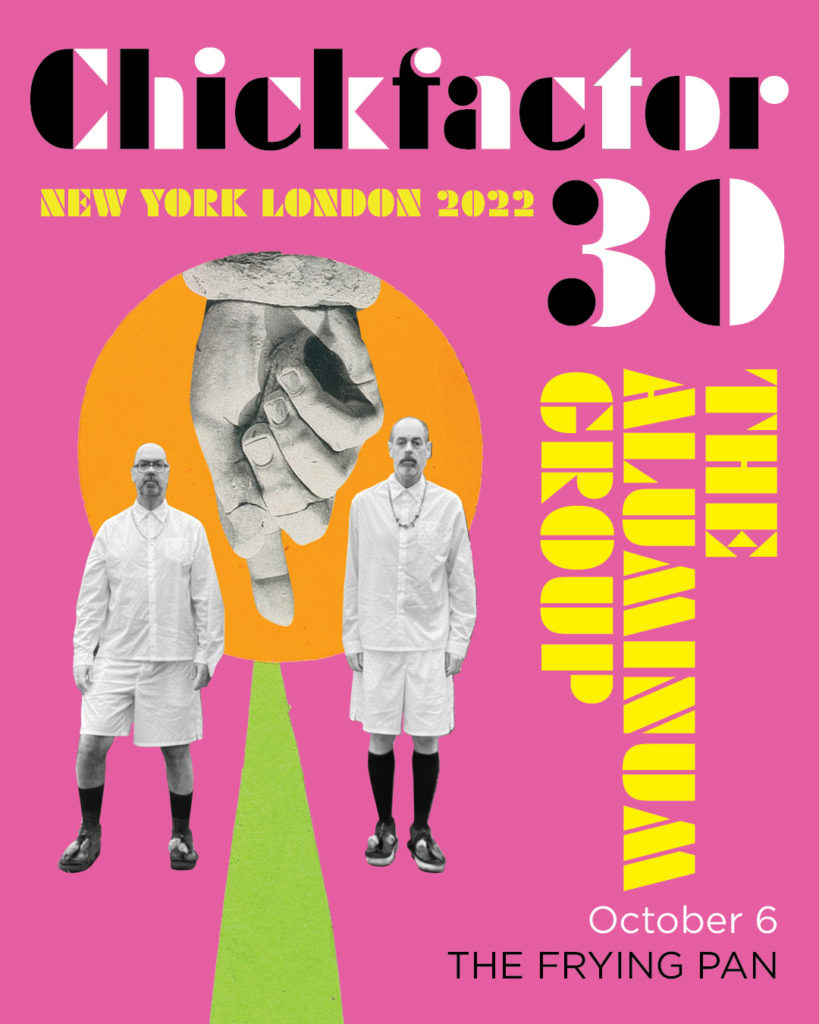
The Aluminum Group
are the brothers John and Frank Navin of Chicago and Detroit, who recently released a wonderful new album. John says of this event: “Our performance is very audience interactive. We start with a brief demonstration and teach attendees how to make paper laurel necklaces, then we sing 5 new songs. Show a new short film by Frankie. Then sing sing 5 more songs from the new record, then encore with a new unreleased song from our next record, called ‘Punch The Lights Out Of This Crazy World.’”
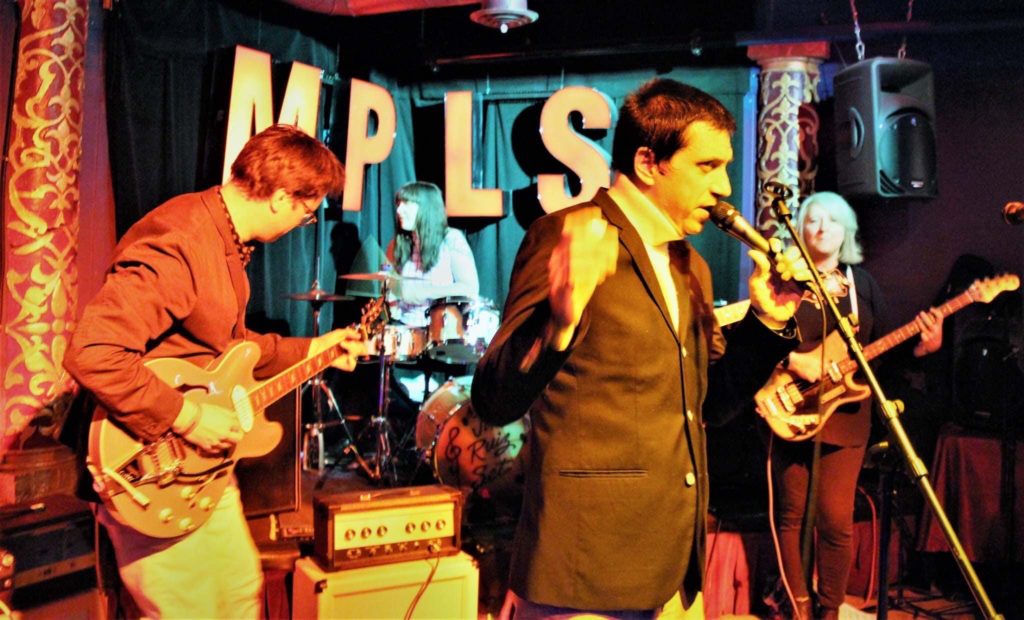
Jim Ruiz Set
Led by the Legendary Jim Ruiz (guitar, vocals), the set also features Emily Ruiz (drums, vocals), Mike Crabtree (lead guitar) and Charlotte Crabtree (bass, vocals). The Twin Cities outfit has been playing CF events since the olden days and never ever disappoints.
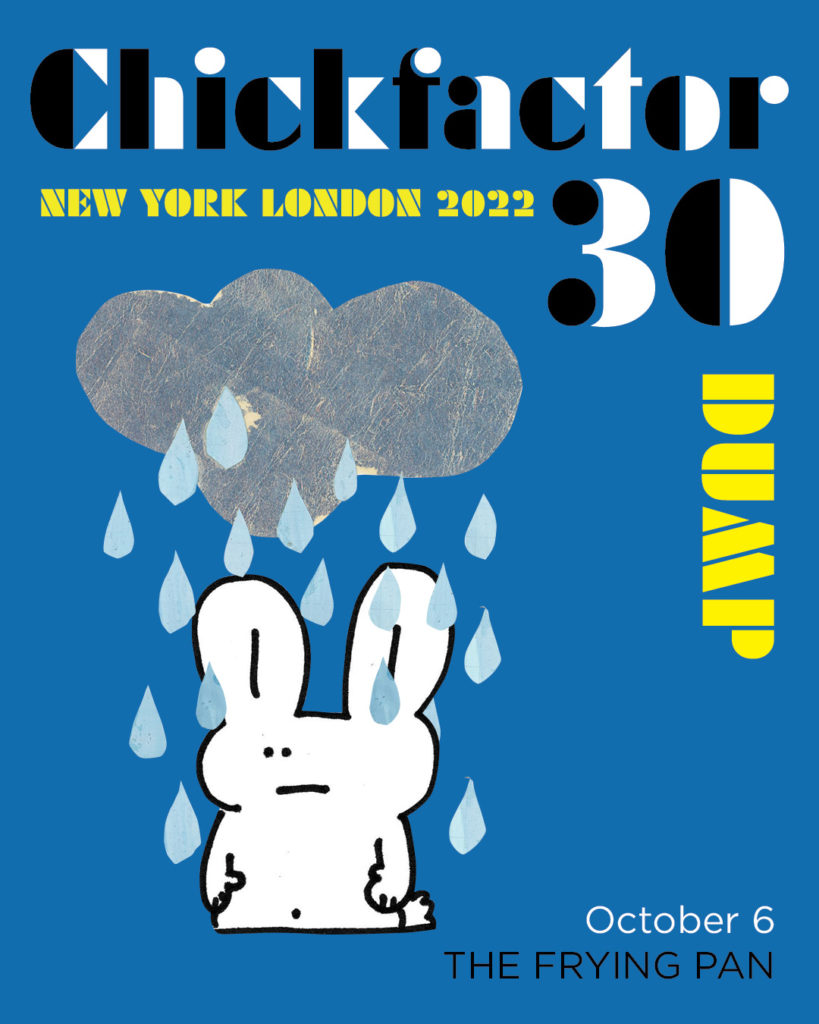
Dump
Brooklyn’s James McNew is the force of nature behind Dump, which was interviewed in Chickfactor 8 back in 1994. Some of you may have heard of his other band, Condo Fucks. We are pretty sure that he will be playing solo tonight and that this is the only Dump show happening anywhere in 2022.

Girl Scout Handbook
Girl Scout Handbook was formed by Brooklyn high school student Beatrix Madell, an avid musician and music fan. The band is technically 5 people, Madell, another guitar player, a drummer, a trumpet player, and a keyboard player. They will be doing a set of covers for tonight’s show!
—
Sat. Oct. 8:
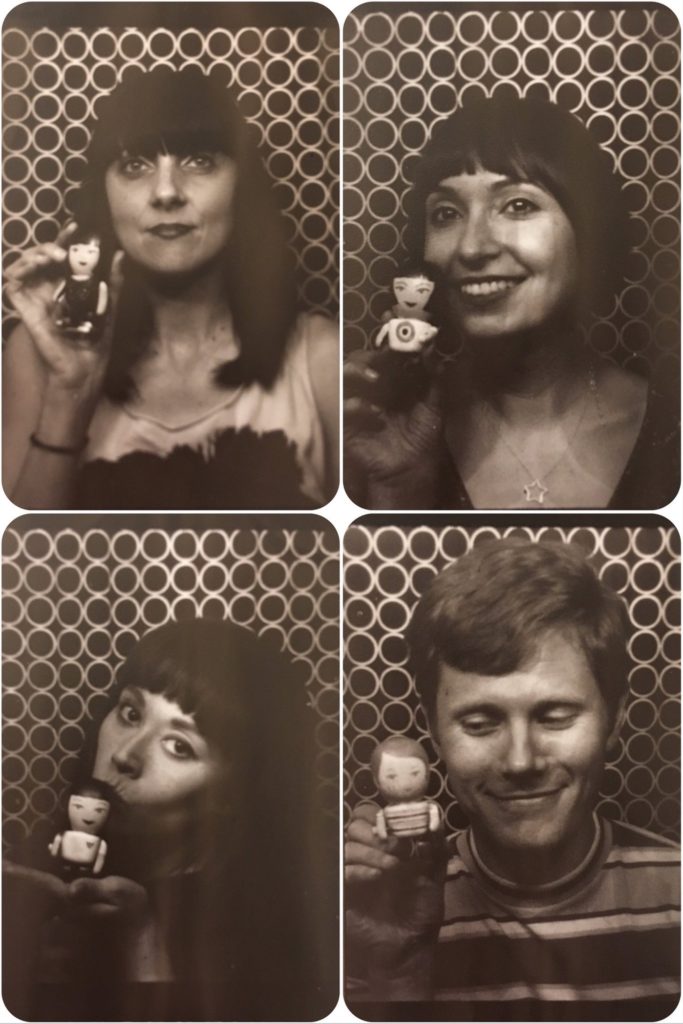
Seablite is a four-piece pop band from San Francisco inspired by 80s/90s indie and shoegaze. In June 2019, Seablite’s LP debut, Grass Stains and Novocaine was released by Emotional Response, garnering domestic and international praise. They’ve since released a 10″ EP, High-Rise Mannequins (2020) and most recently their new single, Breadcrumbs c/w Ink Bleeds (2022). Seablite are back in the studio recording their sophomore LP and looking forward to what the upcoming year will bring. East Coast/NYC debut!
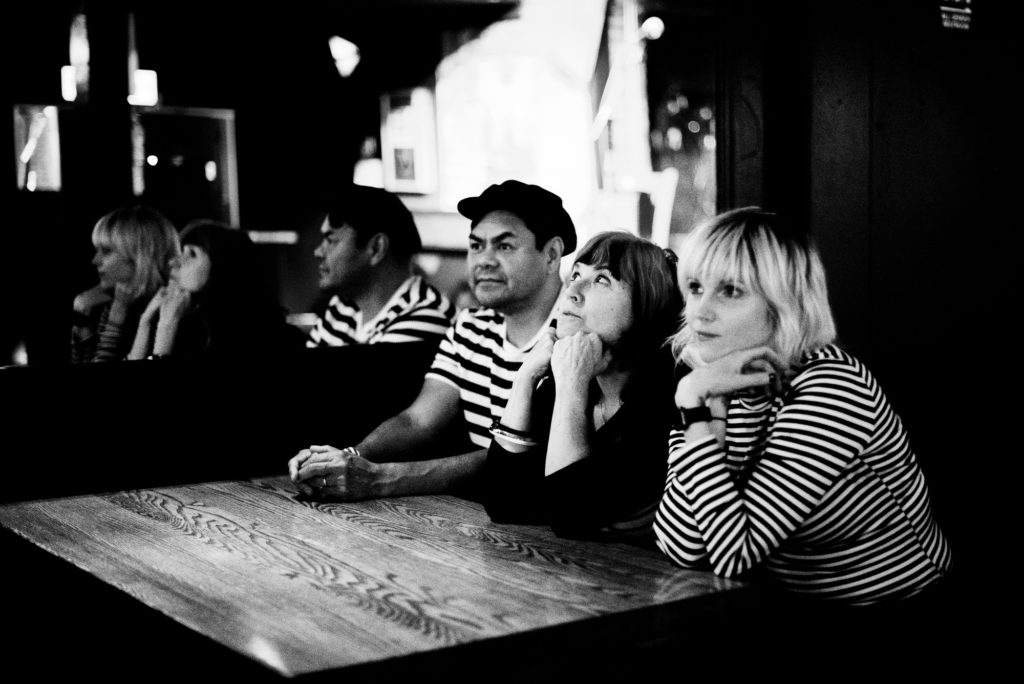
Artsick is an indiepop band from Oakland/Seaside, California, consisting of Christina Riley (Burnt Palms/Boyracer) on guitar and vocals, Mario Hernandez (Kids On A Crime Spree, Ciao Bella) on drums and Donna McKean (Lunchbox/Hard Left) on bass. They formed in 2018 and released a 7” inch single, followed by their debut album “Fingers Crossed,” on Slumberland Records. East Coast/NYC debut!
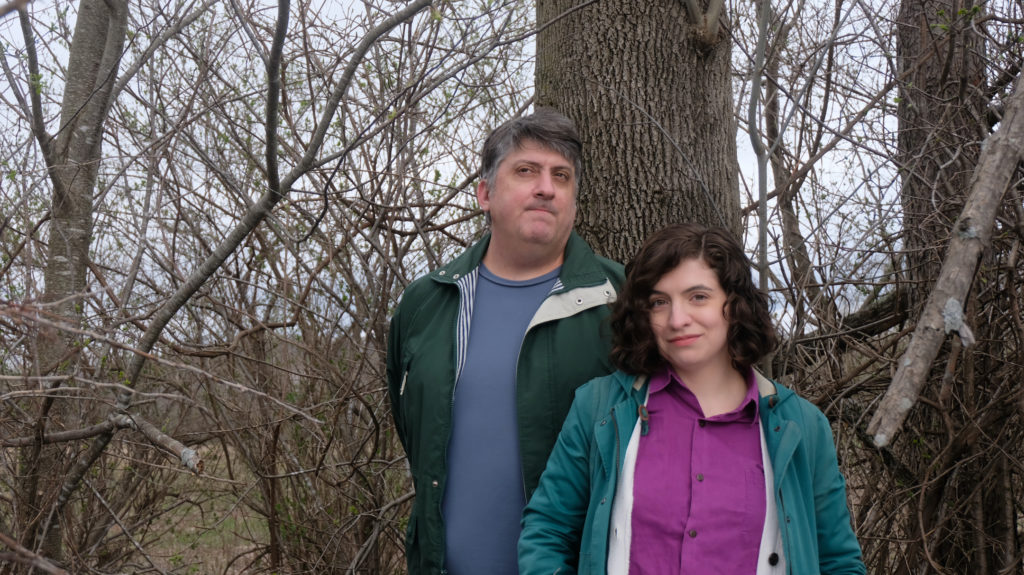
Jeanines specialize in ultra-short bursts of energetic but melancholy minor-key pop. With influences that run deep into the most crucial tributaries of DIY pop — Messthethics, the Television Personalities, Marine Girls, early Pastels, Dolly Mixture — they’ve crafted a style that is as individual as it is just plain pleasurable. Alicia Jeanine’s pure, unaffected voice muses wistfully on the illusions of time, while My Teenage Stride/Mick Trouble mastermind Jed Smith’s frantic Motown-esque drumming and inventive bass playing provide a thrilling rhythmic foundation.
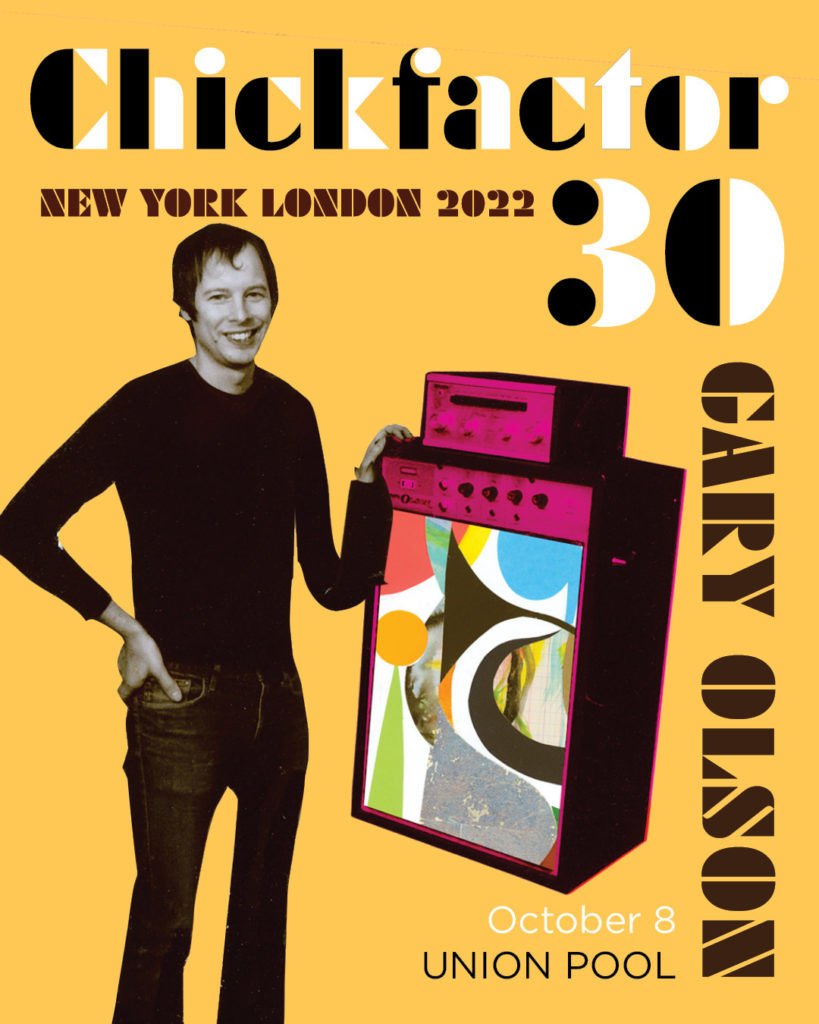
Gary Olson
OG Brooklynite Gary Olson is best known as the leader and founding member of The Ladybug Transistor, but he made a wonderful solo record in 2020 as well, and has collaborated with many bands including the Aislers Set. He also runs a famous studio in Brooklyn called Marlborough Farms, and will be playing as a duo tonight.
Magic Roundabout was a noisy pop band in Manchester (and Nottingham) that existed from 1986 to 1988 and didn’t release any records at the time (apart from a track on a cassette compilation). This past year, Third Man Records released a 7-inch single called “Sneaky Feelin’” and a six-song LP called Up, which are so up our alley. We checked in with two of the six band members, Nick Davidson and Linda Jennings, to find out more about Magic R and the music they’re making now with Thee Objects. Interview by Gail O’Hara / Images courtesy Magic Roundabout (This interview appears in chickfactor 19, available now in print)

chickfactor: How have you been holding up during the pandemic? What have you been doing?
Linda: Played my classical guitar, painted and learnt some languages. But gradually stopped that when work started coming in.
Nick: During the pandemic I was putting the Magic Roundabout LP together and sorting out the promotion with the band, best to be busy maybe? I’d retired as a mental health nurse in 2019 so had time to do that.
How long was Magic Roundabout a band?
Linda: We formed around the summer of 1986 but split in early 1988. So not long.
How did it come together?
Linda: I was attending Art College and met Paul (Chadwick, bass) on the bus. We chatted about music and decided to form the band.
Was it named after the TV show?
Linda: Yes.
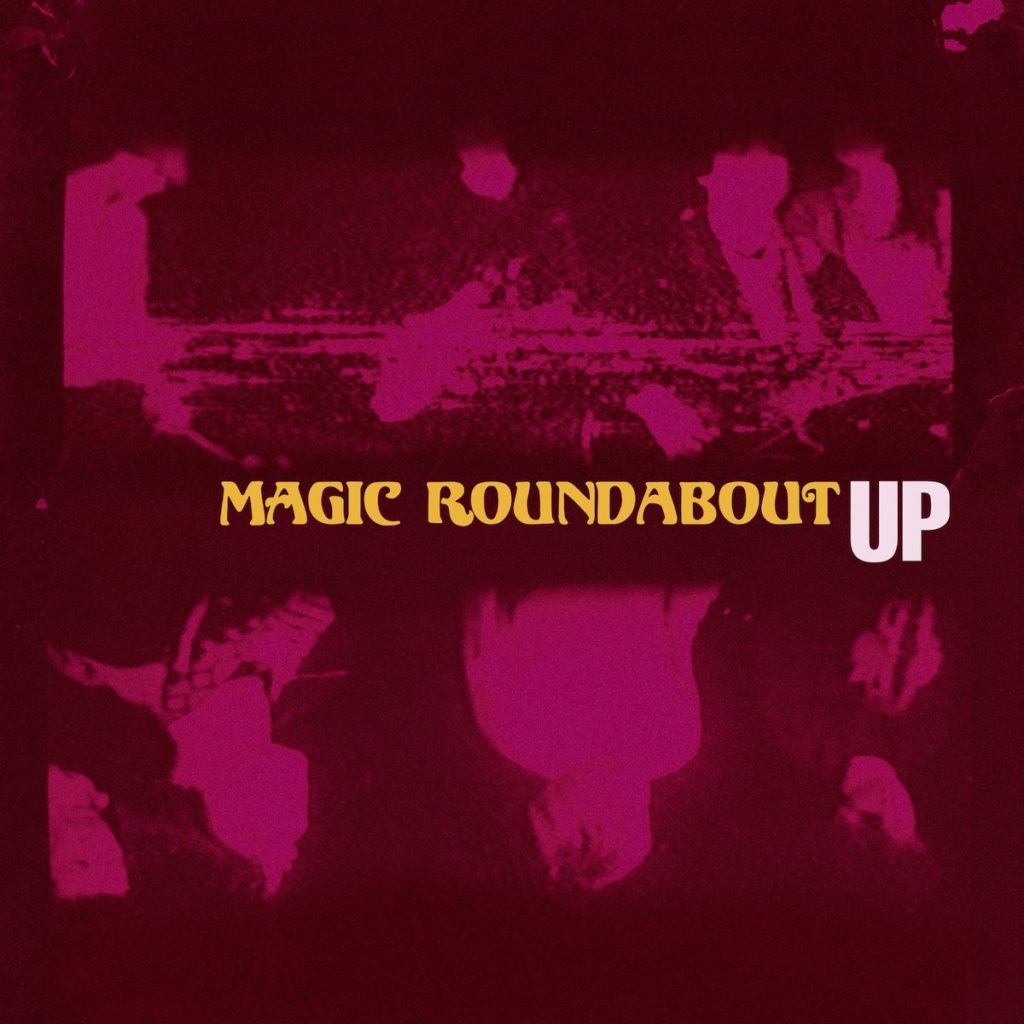
Where all have you lived? And where do you live now?
Linda: We all lived in and around Bolton, then the band all moved to Nottingham. Nick lives in Shipley. Myself, Paul and Karrie live in Stockport. Nicola is in Bolton and Maria in Sheffield now.
What were you listening to at the time? Did you feel part of a scene, a community?
Linda: I loved indie/alternative music, ’60s and local bands. Yes, I liked to go to local gigs and support them.
Nick: Shop Assistants and Jesus and Mary Chain were our stepping off points. We’d been passionate about Bauhaus, Cocteau Twins, The Fall before them, but I think we were 17/18 in ’86/’87 & we couldn’t play very well. We’d wished we’d been born in the ’60s because everything seemed to be going downhill in the ’80s. To think how it is now. ¶ We were friends with Inspiral Carpets. We recorded at Clint’s studio and they were always supportive of us, there was The Tyme Element, King of the Slums, Dub Sex that we felt an affinity with, at the same level as us, getting nowhere really.
Were you playing lots of shows at the time?
Linda: We seemed to gig quite regularly in 1987 flitting from city to city. We played some quite interesting gigs alongside well known indie bands at the time.
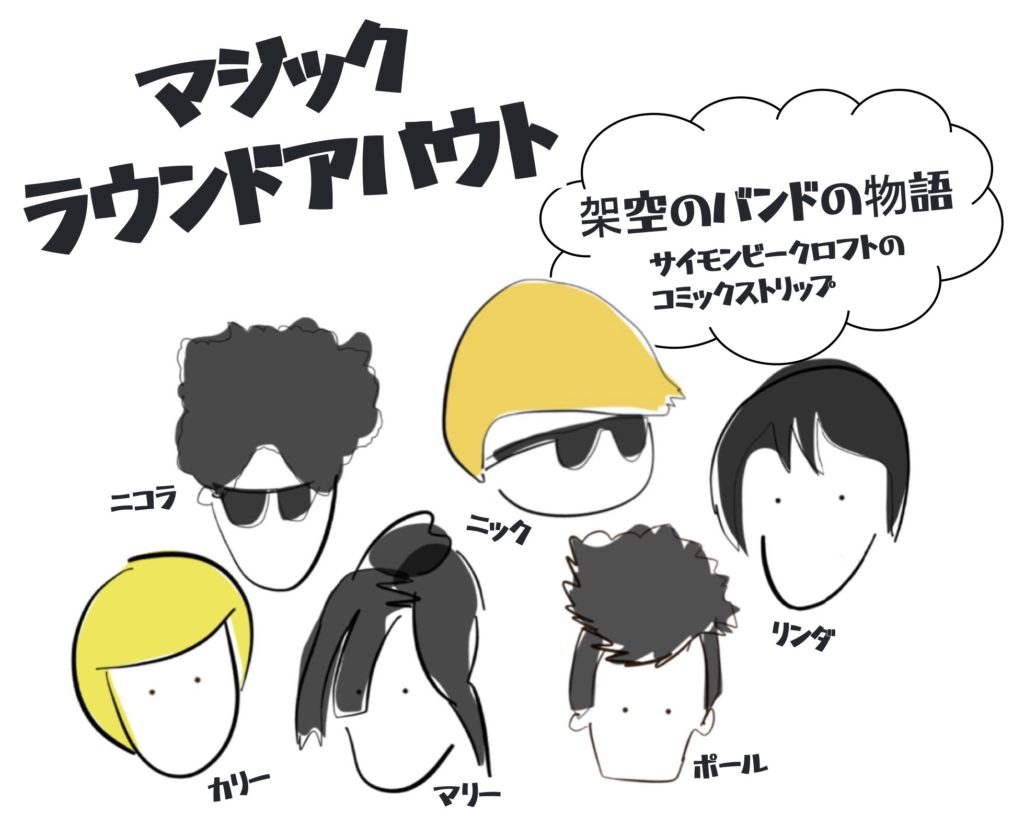
Were you from musical families?
Linda: My mother’s family were musical my Aunt sang professionally for 30 years and appeared on TV.
Nick: My maternal granddad had a great voice and I was told he was a great pianist in the pub, but not so much really.
What were you like as teenagers?
Linda: I was a chatterbox; Nick was precocious the rest of the band were quiet types.
First gig? First record you bought with your own money?
Linda: I went to see Blancmange with my best friend at Manchester Apollo.
I bought “Man With the Child in His Eyes” by Kate Bush.
Nick: Toyah at 13 with my mum; “Mickey” Toni Basil.
Why was the original LP never released?
Nick: There never was an LP. We just had a lot of recordings, actually enough for a double LP. In ’87 we really got the recording bug and it was relatively cheap to record in studios that were appearing in Manchester. We recorded a few longform pieces (as I’d guess they’d be called today) we could only fit one on a single LP.
Linda: We seemed to whip through 1987 like a whirlwind and never endeavoured to find a label or promoter at the time.
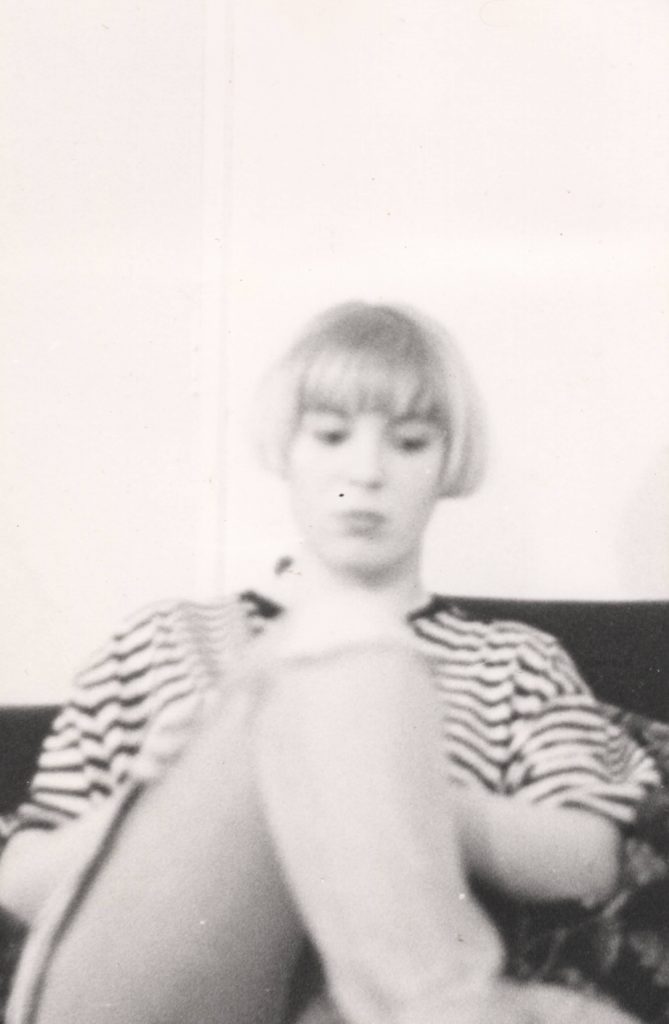
Did John Peel ever give it attention?
Linda: I don’t think we sent him any recordings? But if we did maybe he just had too many to listen to.
How did it end up coming out on Third Man?
Linda: Originally Ian Masters and Nick fancied releasing it from old cassette copies, but Third Man got to hear it and wanted to sign us. So we all jumped on board.
What role did Ian Masters and Warren Defever play in getting the record out?
Linda: Originally Ian Masters did a cover of our song “Carol in Your Eyes.” He asked me to pen out the lyrics from an old cassette copy. Then Ian and Nick wanted to release all our best recordings. So through Warren and Third Man our old cassette recordings got cleaned up remastered and pressed onto vinyl to our delight (no tape hiss).
Nick: We’d met Ian Masters at one of our gigs in ’87 and, as I did the sorting out bit of the band, he befriended me. Magic Roundabout were booked to headline Pale Saints’ first gig in Leeds in 88 by Ian, but we spit up before that could happen. We stayed in touch and became good friends. We (me and Ian) released stuff as PinkEyeSore in the 2000s, recording by post. ¶ More recently Ian encouraged us to do something with our old recordings. Which we obviously did.
What other bands were you guys in? are you in now?
Linda: I have been in many bands as well as playing solo and duo over the years. Some covers bands and some original. At the moment I gig as solo, duo/band, playing original/covers.
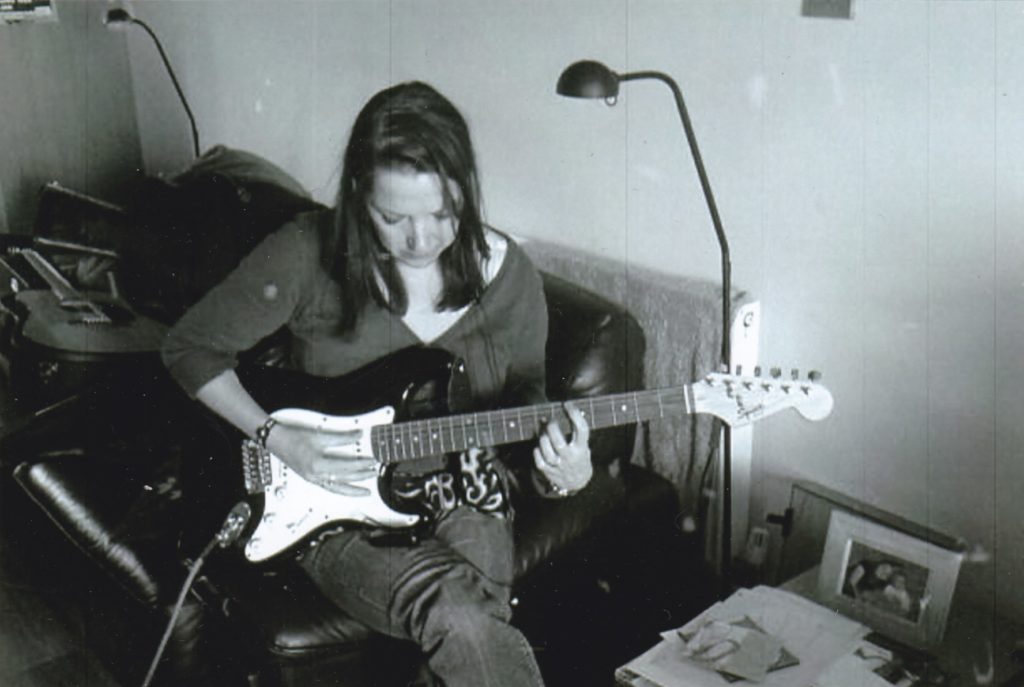
What are you up to these days? Jobs, pets, kids?
Linda: I teach guitar, bass, vocals, keyboards, ukulele and percussion as well as running regular music nights, I do mainly covers gigs. I’ve played most genres. I have one son. No pets as I’m too busy to devote my time to one at the moment.
What are you watching, reading, listening to?
Linda: I like watching documentaries on music, art and sciences.
I don’t watch any terrestrial TV. I like European cinema.
I support local writers of prose and poetry.
I like reading books on health, diet and psychology.
I like a variety of musical styles, most stuff apart from death metal and really dull current pop music.
What are Thee Objects up to these days?
Linda: I’ve worked with Nick over the years and written and recorded with him. The current lineup doesn’t include me at the moment due to other musical commitments but we are hoping to get to together pretty soon to collaborate once again.
Nick: That feels like a whole other story. Recording with Nikki Barr of ’80s UK band Bubblegum Splash! and with Ollie from Evans The Death this year hopefully. Maybe some more 3 Eyed Monkey. ¶ We are looking to release a tape/LP of a couple of Magic Roundabout tracks from ’88, “She’s a Waterfall 2” and “Buildings of Sunshine” and remix/reimaging of MR songs by some pals this year as well, plus part 2 of our comic by Simon Beecroft. Lots of other stuff to be honest.
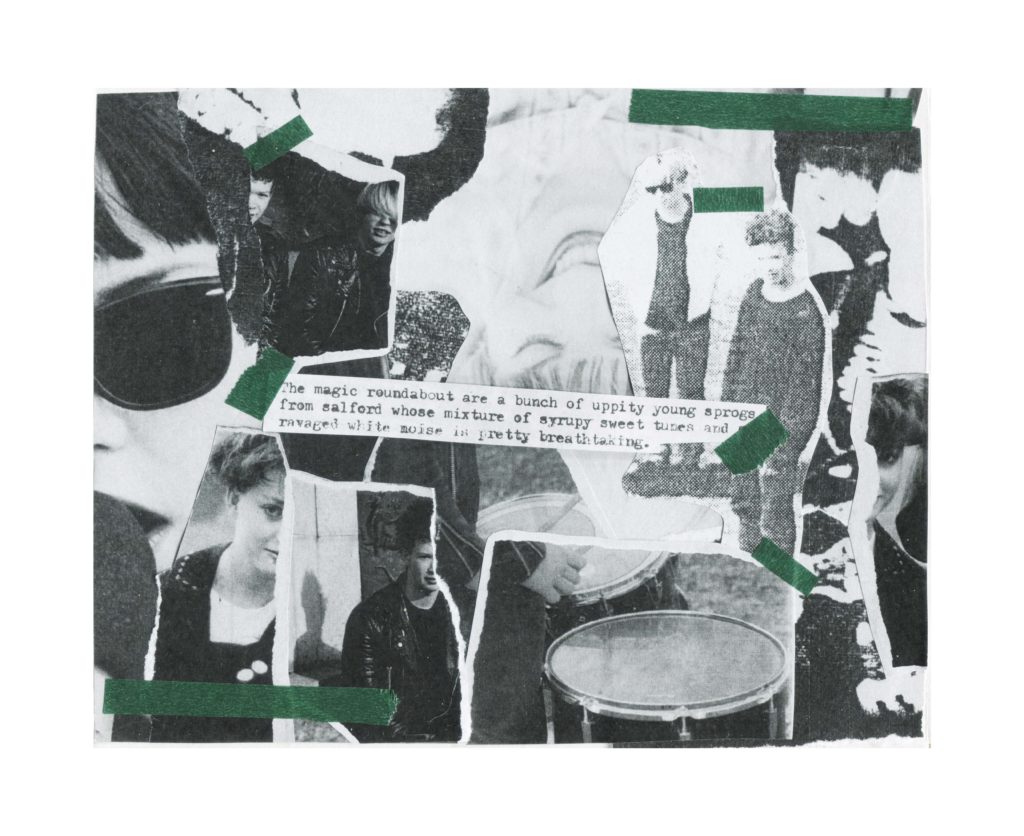
Records Magic Roundabout cannot live without
Linda
Larkin Poe, Venom & Faith
Jellyfish, Bellybutton
John Lennon, Imagine,
Melody Gardot, My One And Only Thrill
G Love and the Special Sauce, S/T
This Mortal Coil, It’ll End In Tears
Carpenters, Close To You
The Velvet Underground & Nico, S/T
David Bowie, Black Star
Frank Zappa, Apostrophe
Nick
Echo & the Bunnymen, Porcupine
The Velvet Underground, White Light/White Heat
Broadcast, Tender Buttons
Pefkin, Celestial Lights
Severed Heads, Clifford Darling, Please Don’t Live in the Past
Leonard Cohen, Songs of Love & Hate
The Seeds, “Mr Farmer”
Miaow, “Fate”
Silver Apples, “Program”
Poison Girls, “Persons Unknown”
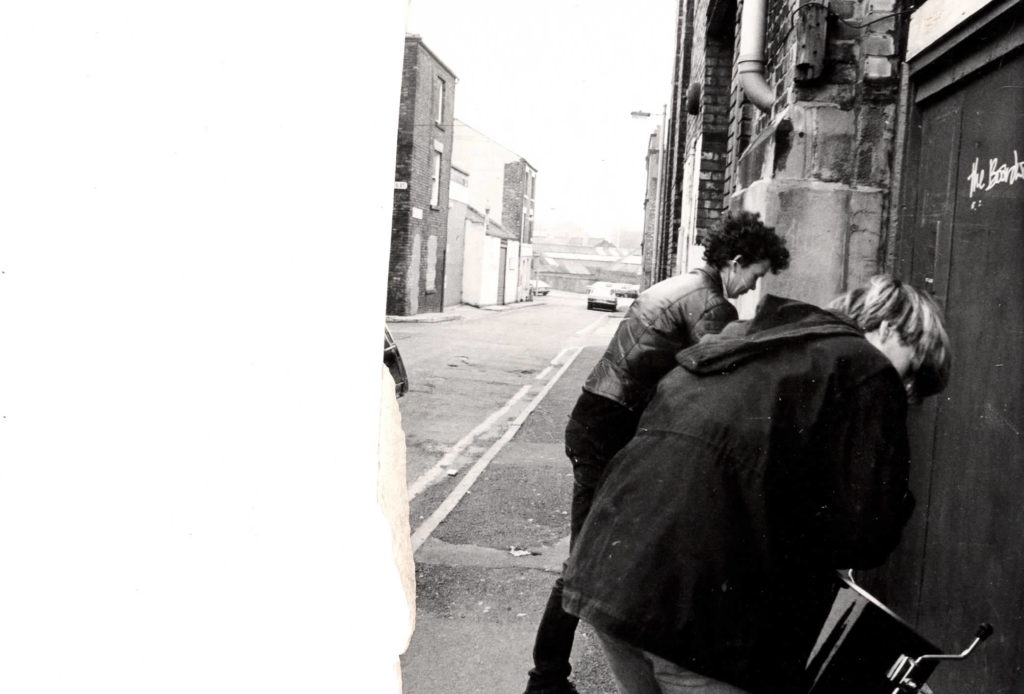
welcome to our new series on record sellers! first up is:
Name: Tracy Wilson
Location: Richmond, Virginia
Operates: Turntable Report, Courtesy Desk, Record CollectHer
Has worked at: Flipside Records (1988-94), Deep Groove in RVA (2010-2016-ish), and has been running Courtesy Desk since Jan. 2021.
Bands: Dahlia Seed (1992-’96), Positive No (2012-2020), Outer World
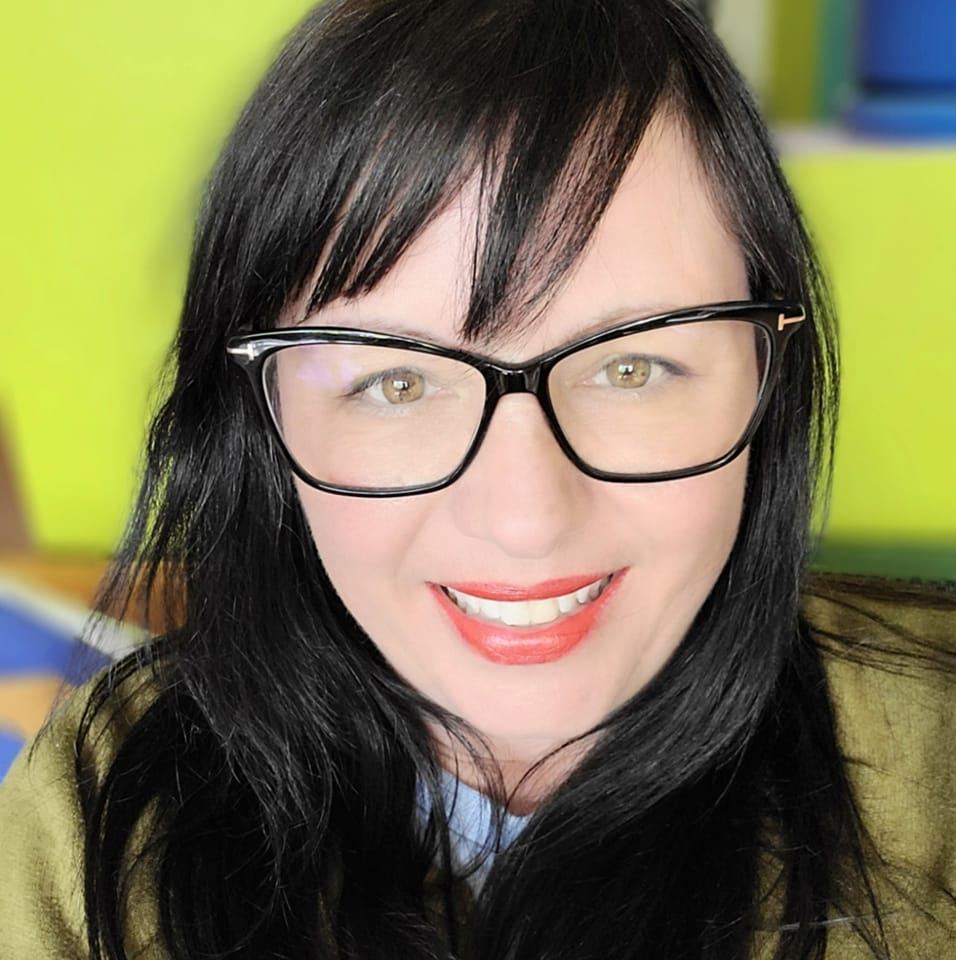
Music lifer Tracy Wilson has been involved in independent music since 1988, starting out as a music-obsessed teenager working at the legendary brick & mortar New Jersey shop Flipside. Many of you know her emo band Dahlia Seed (1992-1996). Then she landed at Caroline Distribution working as a store rep and project manager (1996-2006). When the pandemic hit, Tracy started Turntable Report, a newsletter that does some deep dives to find some of the coolest unheard music out there. As the subscriber base quickly grew, she found her readership was having trouble locating certain titles, so she established the mail order Courtesy Desk. She also does an Insta series called Record CollectHer to correct one massive problem in the music world: the lack of female voices, especially when discussing collecting music. She also does pop-ups in Richmond, Virginia, that offer new records from Courtesy Desk and some used titles, including detailed pricing stickers letting customers know about the record with a description, a RIYL, notes if it might be color vinyl, limited, numbered, or anything else that might help the record find a home. Interview by Mike Turner + Images courtesy Tracy Wilson
This is the first in a new series of interviews with people from independent music retail.
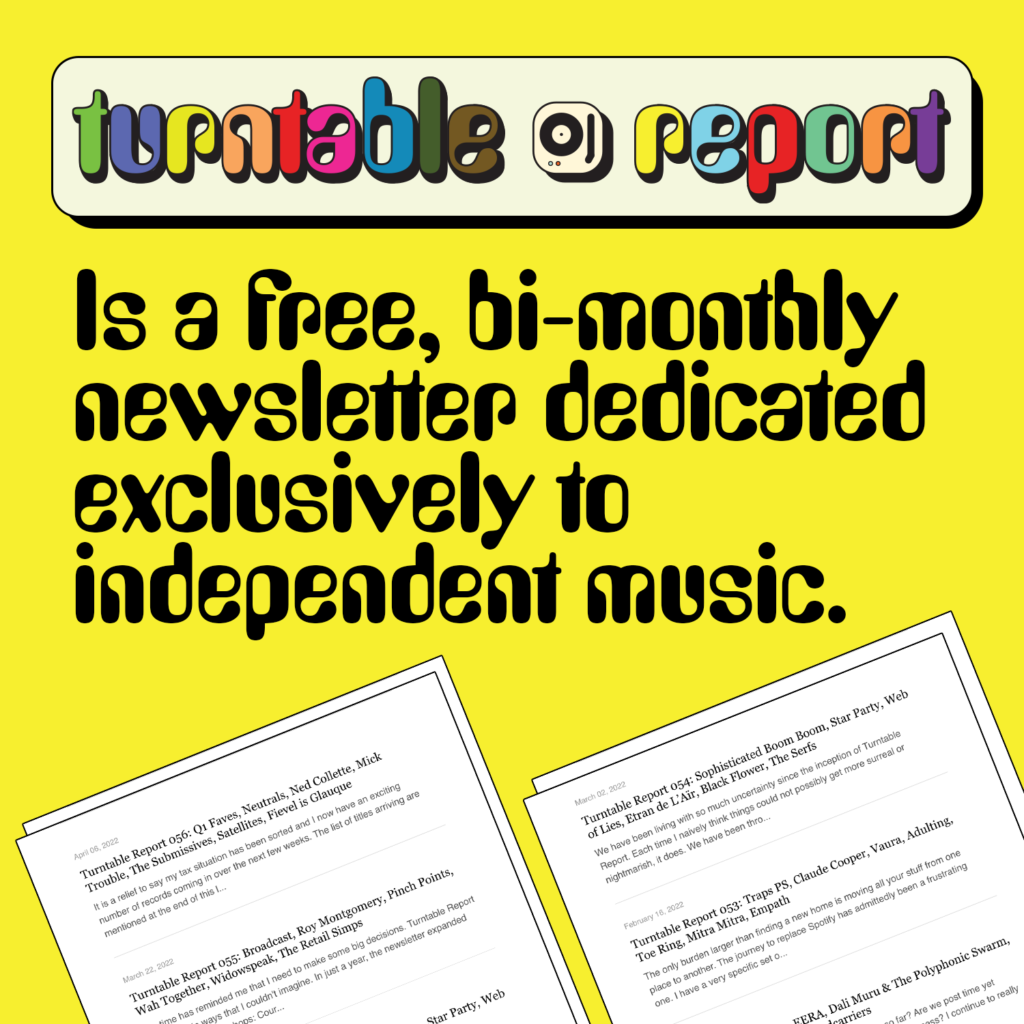
chickfactor: Have you been surprised by the success and growth of Turntable Report? What made you want to launch a newsletter?
Tracy Wilson: Absolutely floored. Popular culture carries deep nostalgia and quite honestly, I have heard so much of that music for the bulk of my life, I don’t need to hear these older “classic” records ever again. I’m good—ha! I have had a long-standing obsession with new music and have kept tabs on it for decades—whether I was working in the music industry or not. As our band Positive No was wrapping up in Jan of 2020, I wanted to fill this hole in my life with a new project that meant just as much to me. I had no idea how many people were looking for a newsletter hyper-focused on new, underground music so I released my first report with zero expectations. It went out to fewer than 50 people at first. It has grown to nearly a thousand readers with zero promotion over these past two years and I am so honored to have these subscribers. It gives me hope that there are a lot of people out there who want to discover new voices and open themselves up to new talent. I know there is no shortage of truly remarkable new records out there, so it is really thrilling to be able to share these finds with a community of people who are equally as passionate about taking these paths less traveled.
When Covid hit, you and Kenneth were doing lots of Facebook DJ party live streams until they started killing the livestreams due to copyright. Did this help spark the next steps of Turntable Report into Courtesy Desk and then Record CollectHER? What is your goal with Record CollectHER?
During the early days of Covid, we had no idea what to do with ourselves. Even though it was only two years ago, it feels like a lifetime ago. The entire world was fumbling through the dark, trying to make sense of things, and find ways to make the days that all blurred together have purpose and meaning. I felt especially desperate to turn my panic into something productive. We went from being very social people who had spent nearly a decade in a busy touring band and spending a lot of time at events centered around art and music. We suddenly found ourselves stripped of all that stimulation and like everyone else, coping with a never-ending parade of never experienced before horrors. Live streaming DJ sets was a way to connect with friends and fellow music fanatics without having to use words we didn’t have yet for what we were all experiencing. The Turntable Report was already happening; however, I now had less distractions to take me away from it. As my discovery of new music grew along with the number of subscribers, I was surprised to learn that this community of readers didn’t just want to read about these records or hear them, they also wanted to own them. Almost as shocking as it was to discover how few media outlets new music fans have to rely upon, was learning that most record shops are not selling these smaller, underground artists either. Courtesy Desk was born out of the necessity to offer readers a place to purchase the music they were reading about. There is power in numbers so rather than just one of us paying to import just one copy of a record which is terribly expensive, if there are 10 of us who all want this record, I can import it in bulk at a much lower cost so not only are we rewarded with the music we want, but at a savings that I get to pass on to my readers who are now also my customers in some cases. I only sell the items I write about so my shop is highly unusual in that sense. ¶ As a woman who has worked at various record stores throughout my life and have also been collecting records since I was a kid, I also know what it feels like to be an outsider in something I have dedicated my life to and am still passionate about. Minorities are often pushed out of these male dominated spaces and in many cases face extreme sexism/toxic masculinity. I created the Instagram account Record CollectHER to highlight and celebrate fellow minority record collectors who deserve to feel respected and cared for. I wanted to steer the conversation away from the flexing of who owns the most records or the rarest, and offer a comfortable place to share their personal stories about what their collection means to them and how it reflects who they are as a person. Record CollectHER is my humble way of bringing us all together and giving this family of music fans a caring home via our mutual love of collecting music.
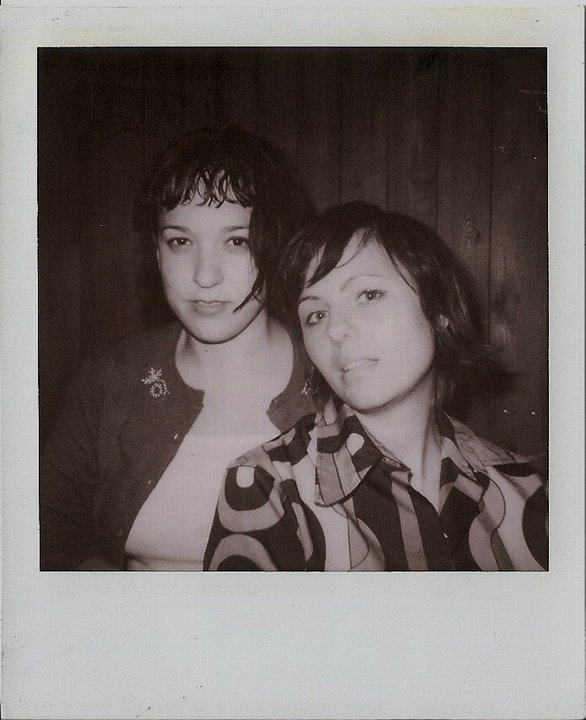
Did you have a goal to launch Courtesy Desk and then push to open a record booth or physical location?
I never dreamed my newsletter would snowball into an online store so for a while I was selling records in the back of a beloved vintage clothing shop in Richmond but a recent rent increase put an end to that. If inflation continues like this, I suspect a lot of labels will not be pressing records in 2023. The overcrowded vinyl making/buying community is being weeded out because of insane costs of everything. While this isn’t exactly the resolve the industry was looking for, I imagine pressing plants will be less backed up as fewer people will be able to afford to run vinyl record labels and move over to other formats. You know what the music industry didn’t need? Another playground for the wealthy. One of the things I really love about record collecting was that it was an affordable way for anyone to own art. I am sad to see this evaporate, but music is such a huge part of being a human being that it will always find a way to carry on. The next generation will decide what that landscape will look like and to me aging gracefully is not only accepting what the future brings, but also learning to appreciate that the world keeps moving forward with or without you.
Do you have a goal to open a full record store or store front or have you given it any serious thought?
Tracy: It has been scary to think too far off into the future. I am still very much taking things month by month. Like most music industry lifers, I do not have much of a nest egg to expand into a larger business. If I were to dream big, I would want to keep a very curated, highly stylized, tiny shop, and have a larger back room space to house my personal record collection that could double as a private social club that invites DJs from around the world to play records, share stories about the music they play, and offer a space for those who want to learn how to DJ, to do so in a friendly space that is open to all. To be clear though, I am really struggling to make plans for a future that still feels so uncertain.
How do you find the stuff you cover in the Turntable Report and stock at Courtesy Desk?
Tracy: This is 30-plus years in the making. For decades I have been reading music mags and newspapers, subscribing to record store newsletters, and joining band/label/distro mailing lists. I love talking to shoppers and employees at record stores. In more recent times I follow hundreds of music-related social media pages, belonging to a network of fellow new music fanatics who are always sharing their newest finds. I listen to radio shows from around the world, check out the occasional music podcast, and follow an absurd amount of people via Bandcamp which alone is a seemingly endless supply of inspiration. I try to keep an open mind and keep my ears filled with as much new music as I can nearly all day, every day. My entire life has been dedicated to music so in turn my social circle is also mostly music people. These peers are also a remarkable resource that I am forever learning from. I may not be the world’s best music writer, but people would be hard pressed to find someone more dedicated to finding new music, lifting up new artists, and having a willingness to share it with others. Lastly, I work very hard to ensure I am not reliant on algorithms or people who are paid to pitch records to me. I want the music I share with others to be a pure reflection of my dedication, personal taste, and years of experience from being deeply invested in the DIY music community. People can be strangely competitive about finding the next big thing and like to keep these treasures to themselves. I feel the exact opposite way. This should not be a contest. Human beings are making art, pouring themselves into a craft, and they deserve as many of us putting a spotlight on their music as possible.
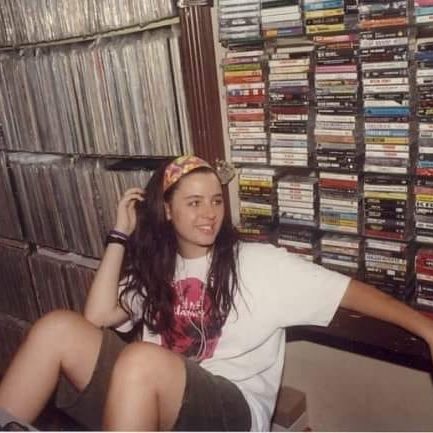
What are your thoughts about RSD?
Record Store Day started with the best intentions, and I think they believe they continue to do important work to drive customers into record stores. Their problem is that RSD has developed into a complicated beast that desperately needs to be reshaped to give back to the music community that helped realize their vision. I am disappointed that RSD has turned a blind eye to the monster they created IE expensive, non-returnable, insanely limited products that pit small businesses against chain stores, bottleneck supply chains that have been further ravaged during pandemic times, and makes life for struggling independent artists even more difficult because major labels continue to control the market and limited/valuable real estate in these shops. There is an ever-growing laundry list of issues that come along with RSD now. They have morphed into something closer to a mob boss backed by the major label thugs who are helping to turn affordable art for the masses into a cut-throat commodity that is closer to day trading than a celebration of human expression. RSD needs to take the time to listen to their community, hear out the needs of their partners, and make some much needed changes. If the music industry wants to survive and grow, RSD needs to help empower and lift the community that has been there for them since the beginning.
Do you find multi-color-vinyl pressings to be a positive or negative to the industry?
Ughhhh. I am so completely disinterested in colored vinyl and how it manipulates music fans to focus less on the art and more on obsessive consumerism. The industry has a long history of taking advantage of music fans and catering to big box stores who demand exclusive products. This is not realistic or affordable for most consumers to keep up with nor can independent musicians/labels afford this gross trend that further chokes up already overwhelmed pressing plants.
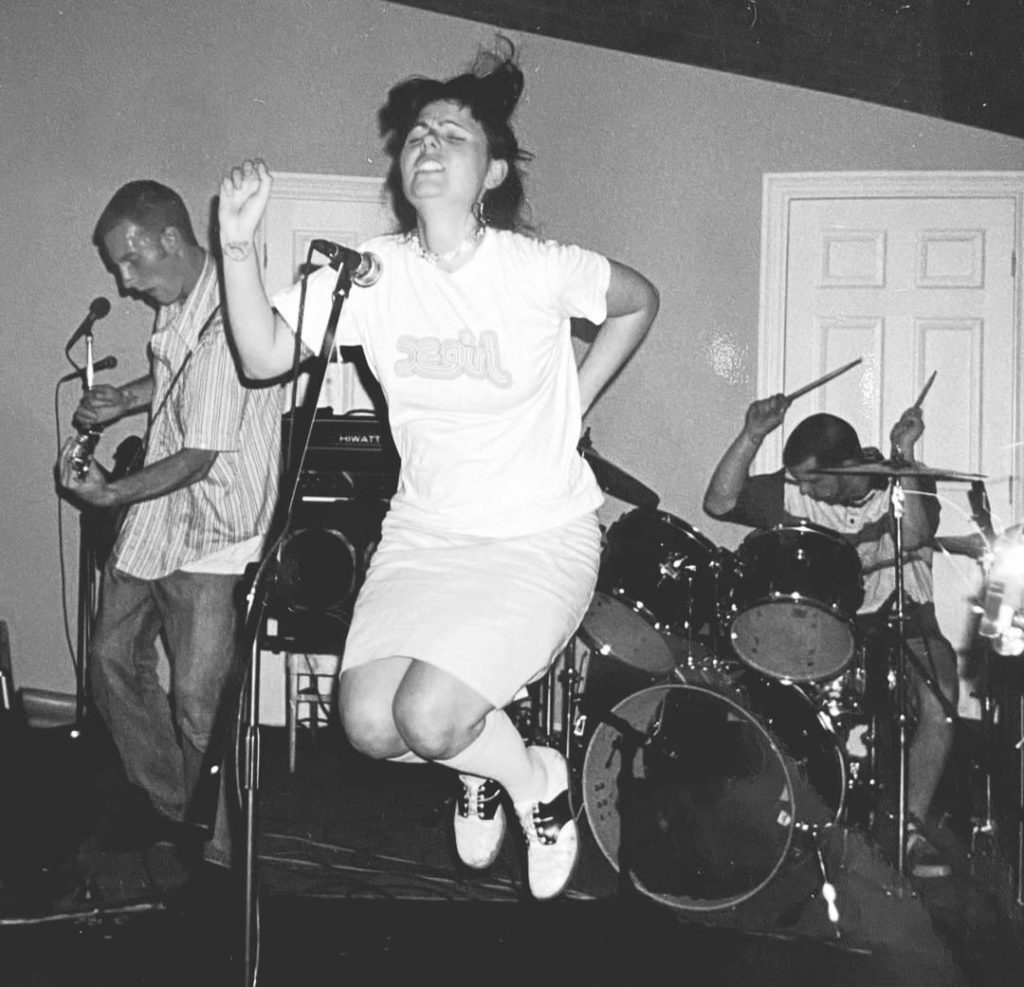
Do you find it scary to see the big box retailers getting back into stocking vinyl? Having been in the biz long enough, we know what happens when they pull out of it.
Seriously, the music industry has the shortest memory in the world and NEVER LEARNS FROM THE PAST. The bubble burst is coming and honestly, I am ready for it. Big box retailers are fair-weather friends who don’t really give a shit about the art at the end of the day. A product is a product is a product to them. I don’t blame them for jumping on the fad to make a quick buck, but the end is near. I am truly scared that the biz seemingly has no idea what the shelf life of their product actually is.
Do you think the CD revival has legs and are we getting near peak vinyl?
I am so nervous to make any prediction when there are so many wild cards in the universe right now. I am still not convinced that new generations will be as excited to own objects that take up space in a world where living spaces are becoming smaller and more expensive. Records, CDs, tapes, books, and DVDs are admittedly a pain in the ass. They take up a lot of space, are a nightmare to move, and more often than not, do not increase in value. In no normal world do collecting any of things makes sense in a digital world. Don’t get me wrong, I am thrilled it is still happening, but ultimately, even though I am a collector myself, I care about the art and the people who bring that art to life more. I want music to be affordable yet also allow these makers to survive off of their talents. The whole industry needs to be burned down to the ground and reimagined to be more eco-friendly, artist forward, and welcoming to all kinds of people.
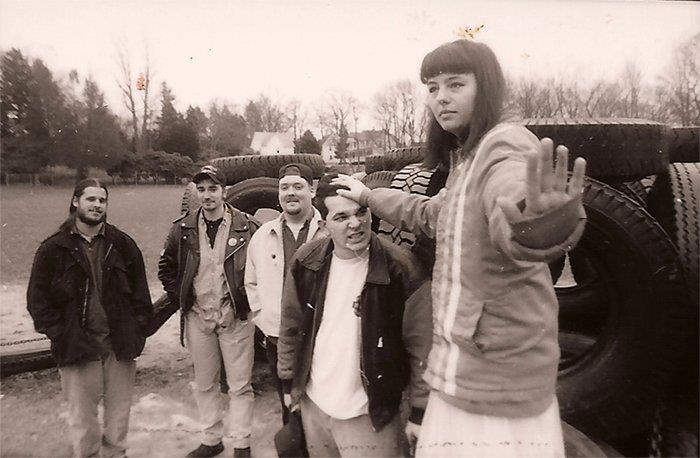
There are so many ways to find records these days: mom & pop shops, box stores, niche curated online shops like yours, mail-orders, direct from bands/labels. Even bigger music sites like Relix and Brooklyn Vegan are selling music now. Do you feel like it’s starting to become over-extended? With this saturation of places to get records, where do you think the taste-maker like yourself fits into the puzzle?
Is this over-extended or more niche driven to meet the needs of a customer base that is more diverse than ever? Will it last? No. I hope I live long enough to see how younger generations transform the industry that us old timers beat to death/ recycle the same ideas decade after decade. A reckoning is coming, and it will include a spectrum of voices the industry stupidly left out of the conversation for half a century. Bring on the new and different. I am part of the dumb old guard. I am self-aware enough to know my days in the business are numbered and I am okay with just being a fan again because ultimately, that is who I am to my core.
What is next for Courtesy Desk/RecordCollectHer/Turntable Report?
I think a great deal about my age and where/if I still belong in a community that has been my second family for my entire adult life. I do not want to overstay my welcome. Aging out of the community that has been my literal everything for decades is really hard. I think music has allowed many of us Gen Xers to live a Peter Pan lifestyle and figuring out what aging gracefully means to me is a constant internal dialogue. A serious case of Covid early on in 2020 stole my lung power so I have already been forced to reconcile the fact that I am not the person I once was. Singing is much more of a struggle for me now, another thing that has been a huge part of who I am for most of my life. Making music is so important to me, my sanity, and it has also been at the heart of my relationship with my husband. We have been making music together for over a decade and while some couples have children, we make records together. I am currently working very hard to take care of myself after a very hard two years of health issues so I can continue to do the things I love: make music, support the music I believe in, write (poetry/memoir in the works), DJ, and travel. My biggest dream at the moment is to feel good first and see what happens from there. I think as the fog of the pandemic lifts, a large number of us will be making some major life changes. We have all been through a really scary, difficult time. For those of us who are lucky enough to still be here, I think many of us might be feeling better equipped to face the unknown and take some bold chances while we can.

What do you think needs to happen more than anything else right now within the music industry?
I cannot stress enough how ready I am for a total industry do-over. I want less old, white men running the show in basically all aspects of the planet.
With your extensive life within this mess we call indie-rock and so on what advice would you give bands / labels / stores?
I wish I had more confidence through my twenties and thirties to trust myself and my instincts. In the end I let my imposter syndrome get the best of me and I wouldn’t wish that on anyone. I would beg those who are creative makers and doers to listen to their own voices and ignore the static around them. Don’t be scared to fail because this is how we all learn some of the most important lessons and get better/ become better people. Life goes by so fucking fast and regret is the heaviest weight a person can carry.
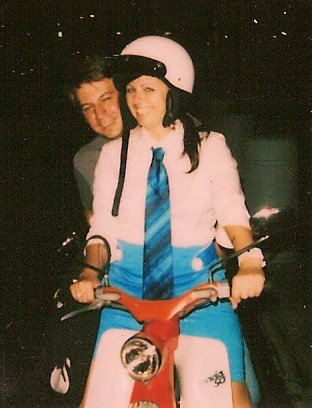
Your honesty about getting out of the way is refreshing and I’ve been thinking and feeling that same way myself a bit before the pandemic. I have made some big changes and see my place as more of an information desk for people left out or to use my connections to bring some of the next generation up. To me that kinda feels like what you are doing with all of your projects as well. So instead of looking at it as a way to age out gracefully, could you see how your wealth of knowledge and true DIY spirit could be a resource and inspiration for a lot of folks coming up that haven’t made those connections yet?
There are a bounty of wildly talented people making music and releasing records right now. I see many of these creatives struggling to find their way and falling into the traps of an industry that likes to take advantage of them at their most vulnerable; vulnerable being that in many cases they are young, naive, and inexperienced. I may not end up in an above the board official music industry position, however as a caring human being, I want to help these people the best I can. The industry is like a hungry vampire always looking for fresh blood. As someone who genuinely wants nothing for these people other than success and happiness, I am dedicated to giving them honest insight and connecting them with the people I know can be trusted. My opinions are not clouded by financial ties to a band or label’s decisions, so when I offer insight to those who come to me, my answers come from a pure place and one based on decades of experience. I don’t have kids, but I am ready to mom tough love anyone in music who might need it. Money and power are of zero interest to me. I want to help nurture these people and their art in a safe and caring way.
What are you up to this summer?
Our pandemic home recording project Outer World is going to Kansas to record an EP at the relatively new recording studio owned and run by Caulfield from Sweeping Promises. It all came together rather quickly when their European tour was canceled, and they suddenly had some time available. I have been working on strengthening my lungs after two years of long Covid and I honestly wasn’t sure I would ever make another record again. At this point I think my insecurities and nerves after such a rough two years with my voice are my biggest hurdle to overcome, but I can’t imagine a better place or group of people to dive back into the deep end with. I don’t think any of us will ever say we feel like our old selves again, but making music again brings me at least one step closer. CF
Mike Turner is a music industry lifer who founded and runs HHBTM Records and Crashing Through Publicity. Mike also writes for Maggot Brain and God is in the TV, has hosted the Athens Popfest (2004-2018) and worked in independent music retail for decades with time spent in mail-order, corporate stores, and mom & pop brick & mortar.
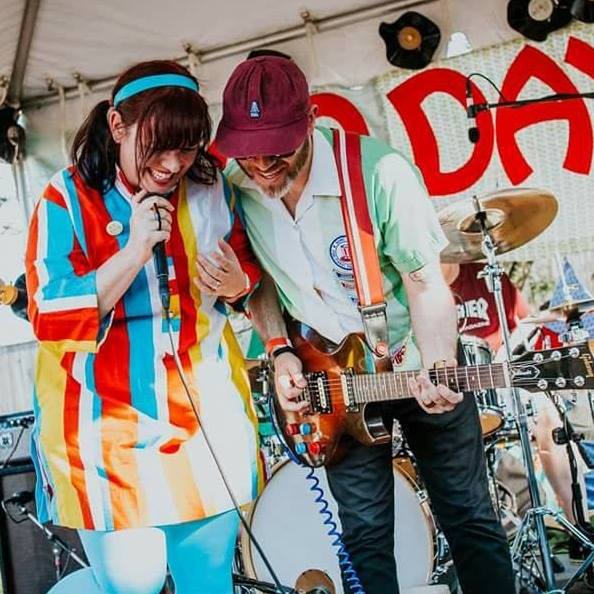
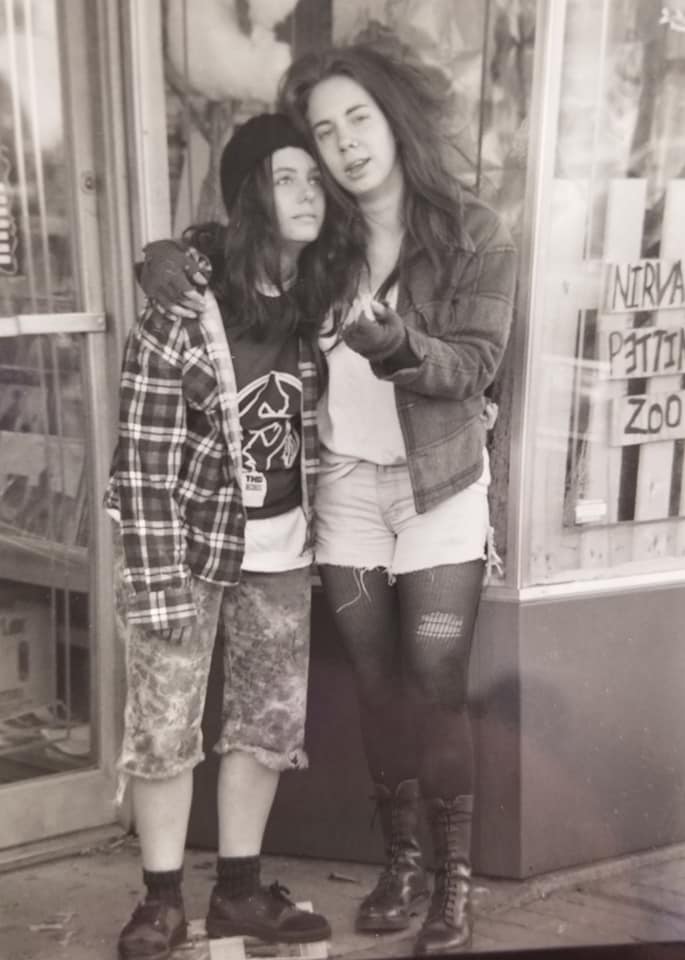
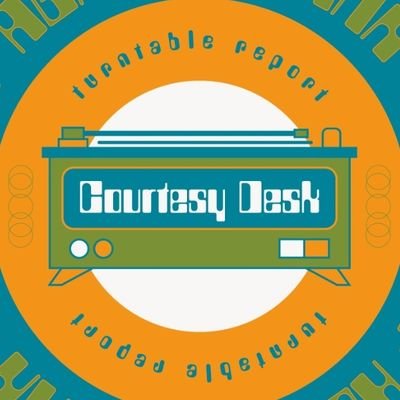
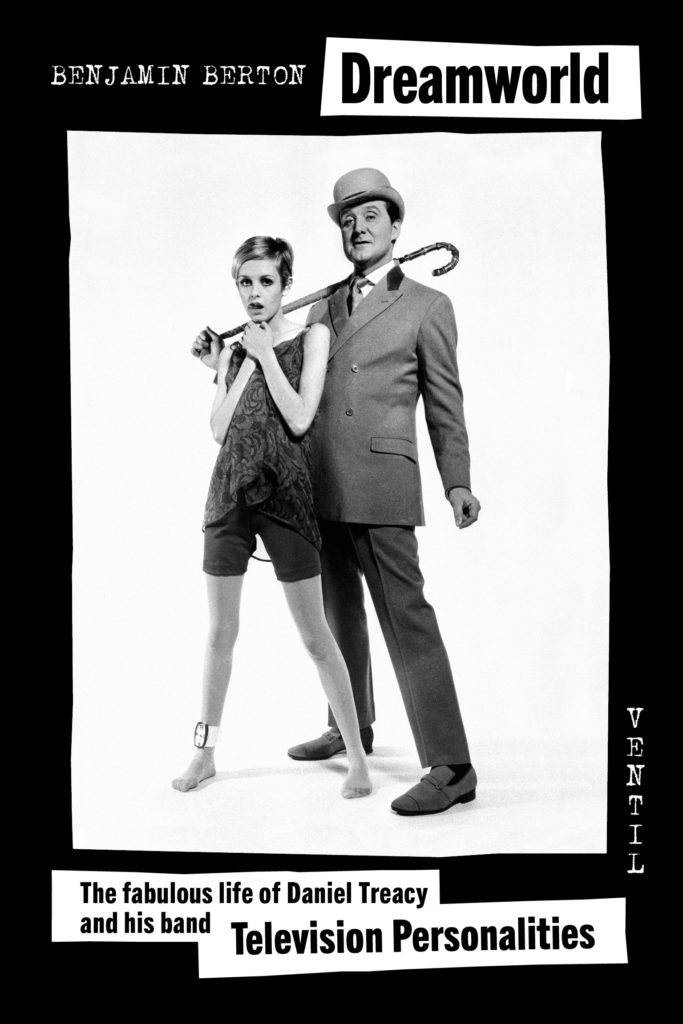
We don’t have to tell chickfactor readers who the Television Personalities are. We are thrilled to share an excerpt from Dreamworld: The fabulous life of Dan Treacy and his band The Television Personalities written by the French novelist Benjamin Berton. It will be published by Ventil Verlag on July 29 and distributed in the U.S. via Forced Exposure. We chose the chapter titled Alison Wonderland because it’s about love and photography along with great pop music and London (a few of our favorite things) and of course the TVPs!
chickfactor: Why did you want to write this book?
Benjamin: I’d discovered the band at the beginning of the nineties (I was born in 1974) as I was a huge fan of British pop music from punk to postpunk. It was a shock for me to discover such an intelligent and melodic band full of cultural references from movies, paintings and books, both sentimental and political, intimate and funny. It was like discovering some band as big and important as the Smiths except almost nobody seemed to know about them. At the time, I started writing books and music reviews for one of the first French indie rock webzines and I made the promise to write something consistent about the TVPs one day. I had written something like 10 novels then, got a few prizes but had always in mind the plan to write about a band. When I discussed doing something for Le Boulon editor round 2015, I started to tell Xavier at a lunch meeting about the dozen wonderful anecdotes I had about Bob Marley, Jimmy Page, David Hasselhoff and Daniel Treacy. We started at 11.00 a.m. and we parted 3 hours later. I realized it was time to write all this down and try to tell Daniel’s story from the beginning to where we were today, so somewhere near the end. And there was already at least 30 books about Morrissey and The Smiths, so why add another? CF
EXCERPT
Alison Wonderland
Six years after the issue of The Painted Word, the Television Personalities return to the 33rpm format with the album Privilege, released this time on the Fire Records label. The company had been set up five years before by Clive Solomon, a former acquaintance of Daniel and the Television Personalities. At the beginning, Solomon and the Television Personalities’ lead singer hung around the same London venues which heralded the psychedelic renewal. Moreover, he had organised gigs inspired by the 60’s even before McGee and others had thought of it, in a new club destined to become famous, the Groovy Cellar. At the time, Clive Solomon wasn’t directly a member of the gang, but hung around wherever they were. His favourite band, among all those who trawled the scene, was … the Television Personalities, who he had seen a good hundred times on stage and for whom he had tremendous respect. It was thanks to them that he had talked to McGee for the first time, and certainly also thanks to them that he had decided to pursue his career. Producer and occasional musician, Clive Solomon’s name figures, at the time of Whaam!, on Sha La La, the one and only single by the brilliant Jed Dmochowski, as executive producer. Whether that means he invested a few quid in the business, or that he was present during the recording sessions, is a matter of debate.
Be that as it may, in 1989 Clive Solomon is still managing Fire Records from his bedroom and is delighted to produce the Television Personalities’ new album, initially promised to Dreamworld. At the time, Fire has not yet defined its strategy, nor emerged as one of the best-entrenched and interesting independent labels on the market. The model would be simple: produce young artistes, but also welcome older guys with a history, in order to try and take over their catalogue via meticulous re-releases and promotion of their new songs. The label establishes itself by crossing the path of gifted and challenging bands like The Blue Aeroplanes, The Farm, Spacemen 3, the main event of 1989, Pulp (the band before success knocked on its door) Eugenius, Mission of Burma, or even Evan Dando’s band, the Lemonheads. It’s a small world. Fire Records has a reputation for allowing its artistes great creative liberty and giving them long-term support. Some are more critical as regards the personality of Clive Solomon. Luke Haines, for example, doesn’t spare him in the picture he paints in his book Bad Vibes. Solomon is described as a rather spineless guy, shy, bald and sallow, overplaying being nice to avoid conflicts. Haines, under contract to Fire with his band The Servants, quits in order to set up the successful band The Auteurs. If Treacy was to hold a grudge against Fire Records and Solomon, as he would against others later on, the release of Privilege and Fire Records’ support of the band in the following years with two intermediate EP’s and a further album, indicate clearly the attachment of Solomon and his team to the Television Personalities.
The label would moreover on several occasions re-release records by the Television Personalities, first in the early 90’s, then again in 2002 to 2003, and continue to accompany the group up until the issue in 2017 of an album containing rarities, demos and other unpublished works, prior to the release of Closer To God in 1992. It would be a lie to say that the label was well thought of by those closest to the band, but everyone agrees that Fire put a lot of energy into making the most out of the band’s reunified catalogue. Of the two albums released at the time on Fire Records, Privilege and Closer To God, it’s difficult say which is the better. The band’s fans usually place them a notch below their first album, which just goes to show the level of excellence achieved. The songs on the Privilege album, produced by Phil Vinall, one of the best British producers, were carved out and even recorded by the band in the course of three or four years of concerts. These are mostly remarkable songs, some even outstanding, which amply demonstrate the excellent health and the unimpaired genius of their composer. Phil Vinall replaces the insufficiently embellished parts, lightens the band’s sound and gives it a clearly pop colouration never attained up to this point. Apart from the weird My Hedonistic Tendencies, a synthpop track which jars and has aged a little, the album is still as pleasant to listen to, after almost thirty years. Daniel Treacy offers one or two compositions which belong to his former psychedelic and arty inspiration, of which the record’s signature song Salvador Dali’s Garden Party, is the best illustration. But most of the record comprises songs with more personal lyrics, where the inherent sadness is offset by the inventiveness of the tunes and the agility of the guitars. Such is the case of songs like Paradise Is For The Blessed, the sublime opening song, or of the sumptuous A Good And Faithful Servant which follows. The texts are redolent of the singer’s existential doubts, of the depression and solitude waiting in the wings, of the disenchantment (the terrible All My Dreams Are Dead) and of the fear of abandonment. The social and political aspects are always present (on Privilege or Conscience Tells Me No), but generally put aside in favour of sad songs which are among the most accomplished in all the band’s discography. Vinall persuades Treacy to emphasize his voice more, which turns out clearly to be a winning card. Never has the vocalist sung so well as on this album, achieving first-rate performances within his register in pieces like The Engine Driver Song, or the very moving What If It’s Raining? The studio work is fluid. Daniel is relaxed and receptive to suggestions. He knows the pieces by heart and doesn’t mind having to go over them several times. He likes to work quickly, plug in, play without wasting time then move on to something else.
Vinall, who in later years, would be involved for several months with the emergence of Jarvis Cocker (Pulp) and Brian Molko (Placebo), is all admiration. He knows that several of these songs are gems, but he also knows that Daniel is aware of his limits and is not infused with the conquering spirit and aggressiveness which produce superstars.
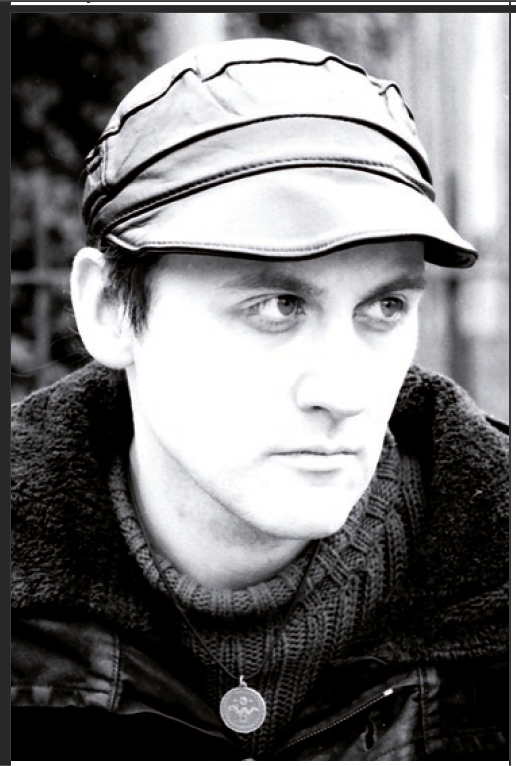
“These are my songs”, he seems to be saying as he deposits them at the feet of the producer. “They’re for you. I’d rather you didn’t return them to me”.
The mixture of rockabilly (Sometimes I Think You Know Me Better Than Myself), of wild or psychedelic pop rock and of lo-fi, give Privilege extraordinary power and richness. A few stylistic waverings may weaken the whole, but in no way lower the quality of the compositions. Privilege is released in February 1990 and has a cool reception, despite the issue in October 1989 of a sound single on the theme of Salvador Dali’s Garden Party. Fire Records does a low-key promotion of the album, accompanied by a British tour of five or six dates as openers for The House Of Love, which achieves little for the band in terms of notoriety. The House Of Love at the time is a band which has a certain success with the re-release of its first single Shine On and the release of their second album. However, the band is in disarray, having barely got over the sensational departure of Terry Bickers and saddled with Guy Chadwick, a leader sinking into a malignant megalomania weaned on alcohol and narcotics. It’s easy to imagine the benefits derived from being yoked together with the Television Personalities.
1990 continues with an endless German tour, but the sales fail to take off, despite an album of the soundest quality. Fire Records and the Television Personalities are not disheartened and release two new singles in the second half of 1991 and the double album Closer To God in 1992. Between these releases, Daniel Treacy, in need of money, signs with the Overground Records label for a series of re-releases of the band’s early singles. John Esplen, the founder of the label, owes his vocation to Daniel Treacy since it was during a conversation at the end of the 80’s that he had seemingly encouraged him to work on re-releasing oldies and afterwards offered him the possibility of reworking his band’s singles. Things would only come into being a few years later. I Know Where Syd Barrett Lives, then Three Wishes are thus revived, just like Smashing Time, Where’s Bill Grundy Now? and Favourite Films. The singles are simply accompanied by new jackets, created most of the time by Alison Withers, Daniel Treacy’s new girlfriend.
This frenzy of releases, for a band which is not necessarily often in the public eye, gives a strange impression to observers and blurs the communication connected with the new songs. Difficult to know, if you’re not watching closely, which songs are re-releases and which ones are new, particularly as the band now mixes enthusiastic up-beat songs with almost acoustic numbers where Daniel plays solo in a totally different register. Where does such a band fit in? What are they trying to say? If, at this time, the band still had any hope of achieving recognition other than esteem and acclaim, it disappears into an often brilliant, but for most people, unfathomable mist. The re-releases of the first albums on the Fire label add to the over-production which, while making the band’s music available once again, inspires the feeling that the Television Personalities have, in spite of themselves, become a nostalgic band of the past, bogged down in its own legend. Adding to that the live recording of a concert during the 1984 German tour, released apparently without authorisation from the band, it’s the last straw. It’s a false impression, since Daniel has never been so productive. Songs pour out like water from a tap.
When Closer To God arrives, Fire Records’ usual strategy, which consists in rekindling interest in the band via revivals of its old albums, doesn’t work. The signal is inaudible, as if jammed, and doesn’t manage to provoke any response. The album which contains 19 tracks is nonetheless monumental and worthy of the greatest interest. It’s easy to consider it as the band’s last great album and a magnificent demonstration of their talent.
Phil Vinall, who is producer again, returns to the more rock sound, full of effects and echo of the band’s beginnings, which, in the midst of the shoegaze and grunge wave, gives certain songs a really powerful impact. Closer To God is harsher than Privilege, but never departs from the melodic ambition and quality of the lyrics. The studio work is more extensive than for the previous album, since not everything has been written in advance. The music is meticulous, crafted, and once again, open to experimentation.
But for all that, it’s not “where it’s at” or in tune with what’s “in” at this moment in time. Psychedelia has had its day and British pop is not in much better straits. Because of being ahead of their time, the Television Personalities are caught between two worlds and, for the first time in their career, almost anachronistic.
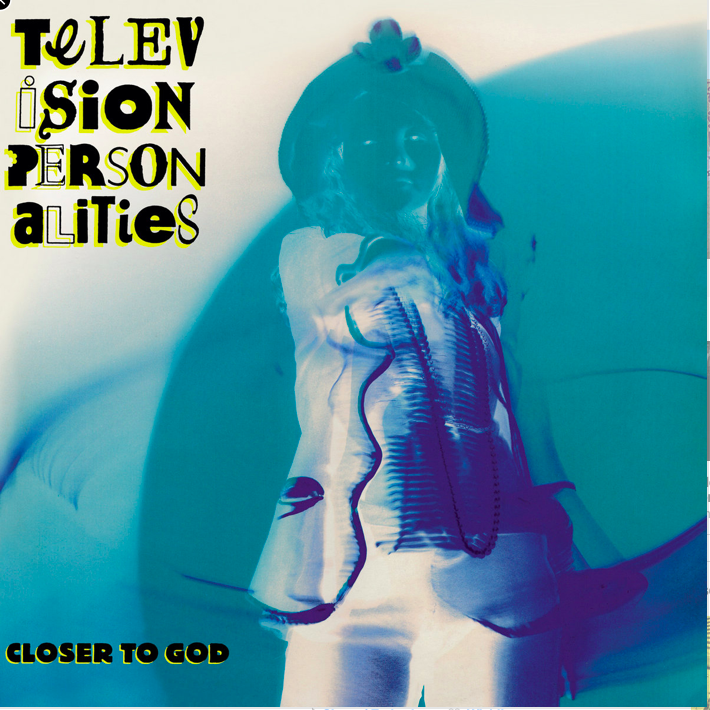
Stylistic coherence is not always maintained throughout the 19 tracks. Some songs are weaker than others, but without much impact on the density and power of the collection. Closer To God is a double album and a further occasion for Treacy to reveal the scope of his talents. The cover, designed by Alison Withers, is strange and relates to no known universe. It’s not clear whether it does anything for the album which gets off to a cracking start with You Don’t Know How Lucky you Are and Hard Luck Story Number 39. In these two songs, Daniel warns the listener (and himself) in prophetic tones, against changes in fortune, drugs and decadence.
“Would you like to see scars?
My brand-new needle-marks? he sings like a show-off
You’ve got a job, a house, a company car
But you’ve still got shit for brains”.
The first piece is particularly violent, mixing biographical lucidity and anger directed against the well-to-do. The song ends with “Open up your mind, it’s an open door”, and like an ultimate copout, bids farewell to the world of escapism and psychedelics. Like the previous one, the album is a sort of patchwork of songs composed in the course of Treacy’s wanderings and inspirations.
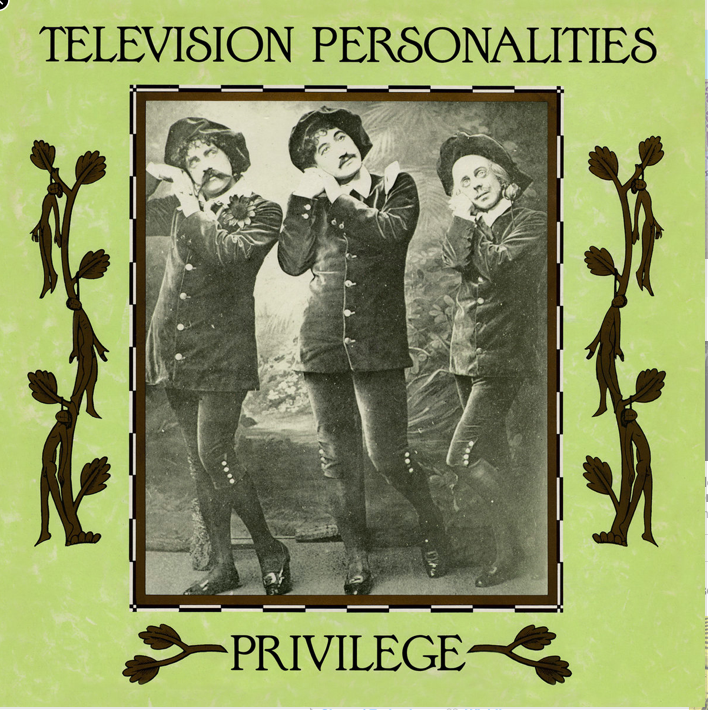
Between the releases of Privilege and Closer To God, Jowe Head and Treacy initially plan to produce a more intimate album which would only materialise twenty-five years later under the name of Beautiful Despair, a compilation of demonstration items and a few unpublished songs. Treacy literally forgets about the project, before re-injecting it by snippets into the monumental Closer To God. There’s an obvious impression that the band want to give it everything they’ve got. Everything is sweetness and light. And it shows: Treacy is in love. His bouts of anxiety, awesomely expressed in My Very First Nervous Breakdown or Very Dark Today, are contained and overridden by peals of laughter, great moments of self-mockery (the incredible Goodnight Mr Spaceman, the very T-Rex-like We Will Be Your Gurus) and above all some very fine love songs. The benevolent optimism of I Hope You Have A Nice Day is pleasant to listen to, but it’s the sentimental tracks which hit just the right tone that makes the album great. Even though he expresses a little clumsily his homesickness (Coming Home Soon) or his daft projects (Me And My Big Ideas) Daniel Treacy is no longer alone and drowns his sorrows in a one-to-one relationship which lights up his world. Few songs describe so well the ups and downs of love as This Heart’s Not Made Of Stone, and even less dwell on the loved one’s face with such attention and ability for amazement as You’re Younger Than You Know. This lofty, contemplative and luminous song is perhaps the greatest on the album. It’s a masterpiece of balance and delicacy in which the poetic images skillfully succeed each other, mixing naivety and sincerity as if it were a poem by John Keats.
“You’re looking younger now
Younger than the newest star
That shines up in the sky
Younger than the newest dream
Baby dreamt last night”.
It’s hard to tell if the narrator is describing the face of the girl he loves, or if he’s talking rather of the effect of love on his own features. However that may be, You’re Younger Than You Know leaves an impression of plenitude and fulfilment.
Closer To God ends with an autobiographical and existentialist eleven-minute-long title of the same name. Treacy comes back to his complicated relationship with the Catholic religion: his strict upbringing, a mixture of violence (at school and probably at home), of guilt and rejection. We know that his father was not a gentle soul and that life in the Treacy household was not always easy. We’ve already mentioned the nostalgic, but ambiguous relations that the singer had with his childhood. They are expressed here in a song carried by bass player Jowe Head, which is not entirely anti-religious, far from it, but transfers the issues of distress and depression into the realm of existentialism and the relationship with God. Maybe Treacy’s career can be interpreted as an attempt to evince a form of original sin, to defile himself and sink to the bottom in order, like the born again, to rise back to the surface. The song suggests as much, but you can’t be certain whether it’s not all an attempt at theatrics. Closer To God, by its length, its intensity and its ambition, seems to be the spiritual and equally disturbed counterpart of Back To Vietnam. Despite the scope of its dramatic impulse, this final song would rarely be singled out as one of the band’s best achievements.
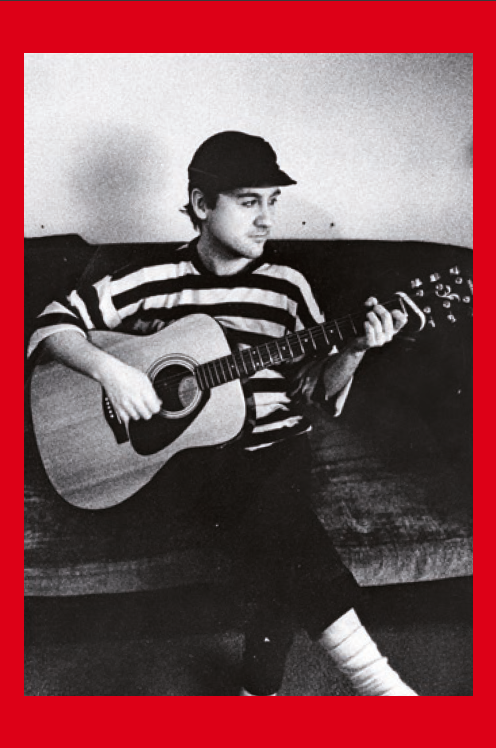
With the release of two such important albums in less than three years and intermediate singles of this quality, at the end of 1992 the lukewarm reception makes things abundantly obvious: The Television Personalities are very unlikely to avoid their fate. British pop is at its lowest ebb. The American invasion is under way and despite favourable critics and reasonable sales, the band’s revival turns out to be a partial failure for Treacy and Fire Records. That doesn’t stop the trio from finally crossing the Atlantic for two successive American tours in 1992 and 1993, and going on tour in Japan the following year. But nobody is deceived by the band’s progress which has all the trappings of a breakthrough which only exists on paper.
Things are starting to fall apart. Daniel Treacy manages to keep afloat thanks to the efforts of Alison Withers, one of the most important women in his life. Lover, best friend and colleague, Alison displays infinite comprehension. Daniel and Alison met up at the very end of the 80’s. The young woman figures on tambourine in a single released in 1987 by a friend of hers, Jerry Thackray, a.k.a. The Legend! She moves in the same circles as Treacy and meets the singer several times at the heights of his splendour. The two meet up one evening in November 1988 during a concert by the Spacemen 3. Daniel has come with Ed Ball. Alison is there with a girlfriend. Like a teenager, she sends her friend like a scout to ask Daniel if he would like to talk to her. Daniel stammers a yes and away you go.
At the time, Alison works in a library in Kensington, not far from Treacy’s parents’ home which is now perched over a Council depot in a block of flats wonderfully named “Sky Gardens”. Daniel had come back there to live after separating from Emilee and having spent several months of homelessness taking drugs and screwing up his head. Since then, he has sorted himself out a bit, surrounded by his family, even if he is still quite unstable. Alison also lives with her parents near Croxley Green, twenty miles or so from the centre of London.
Alison is young, knowledgeable, pretty too. She is free and lots of boys run after her. Daniel Treacy falls in love. And things continue, things go better than well. He comes to fetch her after work and presents her to his parents. His father greets her with a smile. His mother is more wary. Alison was to get on wonderfully with Daniel’s elder sister Patricia, who she still sees even now. In the evening, his mother makes up two separate beds for Daniel and Alison who wait until everyone is asleep before getting together like two secretive children. On Sundays, Daniel is sometimes invited by Alison’s parents to share in the traditional family roast beef. He’s not quite the ideal son-in-law, but he’s on his best behaviour. He talks amiably and impresses them with his pleasant attitude. He spends hours chatting about this and that with Alison’s mother. He has an evident taste for commonplace, everyday things, as if this normality at his fingertips is what he’s always aspired to. A family, a quiet little life, maybe some kids: among the 1001 lives on which Daniel Treacy fantasises, this one has always hovered around him without ever managing to draw him in.
In the summer of 1989, they move into a three-room flat near Acton Town in West London. It’s an old block, built in the 30’s. They do some refurbishing, such as painting the entrance hall black and white. They have come into some of Alison’s grandmother’s furniture, as she has just died. Daniel begins to relax a bit. His drug habit is reduced to a few doses of speed on days when there’s a concert. One day, Daniel comes across a strange bag forgotten on a tube train. Inside is the equivalent of three thousand dollars and five American passports in exotic names, two pairs of binoculars and a very expensive camera. From what he would relate later, the bag was just there at his side. It’s not theft. The bag was calling for help. Daniel takes it and gets off the tube while it’s coming to a halt. Officials arrive and seem to search the carriages and inspect the platform. Daniel makes off. Opportunity makes a thief. The money soon disappears. It slips between his fingers like a fistful of sand. But there’s still the camera, and it determines Alison’s career. Librarian and photographer from now on. The young woman takes her inspiration from pop art, does photos and collages. She goes to night-school. Like Emilee Watson before her, Alison becomes the graphic artist for the Television Personalities. Daniel encourages her with a sincere fervour. He encourages her to take the plunge and enrol at the School of Photography near Paddington, after leaving her job at the library. Alison lacks confidence, but her work gets better and better.
Alison excels at portraits of her boyfriend, group portraits and background shots. How many sofas, pale walls, pseudo landscapes, held up behind the tour bus, peanuts and aperitif tables? Pullovers, jackets, bonnets, whatever you like. Her approach is both distant and eager to grasp everything that is sensitive in humanity, in a corporal pose or the flash of a look. It’s not an insult to other photographers to say that Alison “Wonderland” Withers is the photographer who has best captured what there was of poetic, beautiful and sometimes sadly dark, in Daniel Treacy’s features. You only need to look at the dozens of photos scattered about on the Net to realise it: she created the mystery just as much as she was to reveal it during the seven or eight years over which they shared everything. For the band’s record sleeves, Daniel often gives the impetus, the initial idea. Alison develops and exploits it. One of their greatest successes is the collage made for the jacket of the single Salvador Dali’s Garden Party, which they compose lying on the floor of their flat while their cat Madonna rolls itself in the photocopies. Daniel never stops praising the “little works of art” produced by his girlfriend, which he would immortalise in the song of the same name.
There had been Emilee Watson and the flat at Poynders Court. From now on it would be Alison and Daniel, caught up in the eternity of these seven years from 1988 to the middle 90’s.
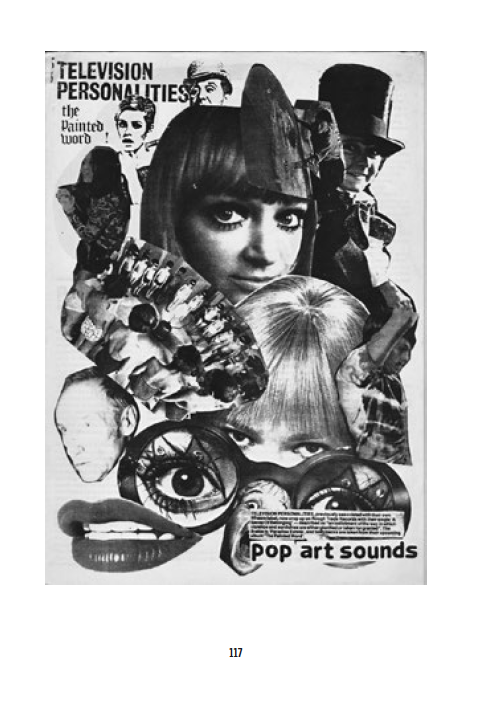
The chronology wavers between the fits of depression, the moments of stability and the air-pockets. It comes in seven-year cycles. Such is the curse. At the ages of 14, 21, 28 and 35. The next one would be devastating, but there’s still some time for happiness and love between the couple. Love is a breath of fresh air. You take refuge in your own little world. Failure is knocking at the door and addiction lurks under the carpet. The flat is a nest, an oasis, small, comfy, held together by the colours, the dreams, the piles of books, drawings and music. The main room is a workshop, based on the inevitable sofa seen on dozens and dozens of photos, on the kitchen table, which doubles as a desk, a workbench for cutting out and preparing the material, a place where they sit and work or just daydream.
Daniel and Alison would keep cats, two most of the time, called Madonna, Andy Warhol or, later on, Orangina. Sometimes their contribution is acknowledged on the record sleeves. Daniel plays the guitar, thinks up songs and writes. He writes texts which gather dust in shoe boxes, poems, dozens of pleasant little notes, short and lively like haikus. He sketches out of happiness. He plays records, reads books. Together, Alison and Daniel watch old British or foreign films, on VHS cassettes bought at the supermarket or second-hand, mainstream programmes or series on TV. They cook with Keith Floyd, the celebrity presenter at the time and gorge themselves on children’s programmes and sitcoms. The Brittas Empire is one of their favourite shows. The series relates the life of an incompetent manager. His ideas are mostly halfbaked and his life is boring. His wife has affairs, or swallows pills to keep her head above water. Gordon Brittas’s deputy suffers from allergies. The receptionist is nuts and keeps her children in the drawers of the reception desk. The series is spectacular and wacky, absurd and slightly cynical. The Brittases are everything which Alison and Daniel will never be. Most of the time, Alison calls Daniel Treacy Mister Brittas. They like the humour of comedian Vic Reeves and his show Big Night Out, which alternates silly sketches and more serious items.
They play board games, frequently matching themselves at Mastermind. Daniel is clever at working out the combinations. He has kept the logical agility of his youth. Black and white key pegs for yellow, green and blue code pegs. There is a complexity and at the same time an inevitability in the trial-and-error approach and in the deduction which makes you think that one day, life will be as simple as the game. You just have to eliminate all the possibilities and have a bit of luck. Mastermind is an allegory of life: you make of it what you can. You reach your goal in one or two guesses, or miss your objective by a move or two. Everything comes down to that: getting there too soon or too late.
Daniel is the sort of guy who never arrives on time. It’s best not to expect him at a rendezvous. Alison and Daniel nevertheless fix thousands of them. She starts by waiting. Then she gets into the habit of guessing when he’ll arrive. She deliberately turns up late. It’s their little unconscious game. It’s obviously much easier to go out together and to leave at the same time so as to be sure of not missing each other.
The two of them go out a lot. There are concerts, of course, usually two or three a week. Alison and Daniel go to the Camden Falcon or the West Hampstead Club, the Laurel Tree or the Boston Arms, pubs and clubs which they frequent. They like to discover new bands and keep in tune with the vibrations of the audience when they first hear an up-and-coming band more talented than the others. Daniel would never lose this curiosity. After the concerts, they often finish the evening, although not systematically, with a few jars down at the pub. Daniel and Alison aren’t keen on parties and are more inclined to spend quiet evenings at a restaurant or in a bar, rather than haunt the night clubs. They have their good addresses: the Stockpot, the Brompton Troubadour, the New Piccadilly or the Honey For The Bears (one of the Television Personalities’ titles) in Acton. Their flat is at 37 East Vale on Second Avenue. They live there for two years before moving to Cambridge Court on Amhurst Road near Finsbury Park in the autumn of 1991. They eat Indian food, good or bad curry, or Mexican dishes in restaurants in Camden or Soho. In London you’re spoiled for choice. Daniel and Alison walk all day long when they are alone together. They like romantic strolls, psycho-geographical walks where you discover the hidden treasures of the town. They linger around in Ravenscroft Park, in cemeteries like Brompton or Old Highgate Cemetery, where Karl Marx and George Eliot are buried. They follow the banks of the Thames near Hammersmith Bridge and explore the East-End back streets between Whitechapel and Liverpool Street.
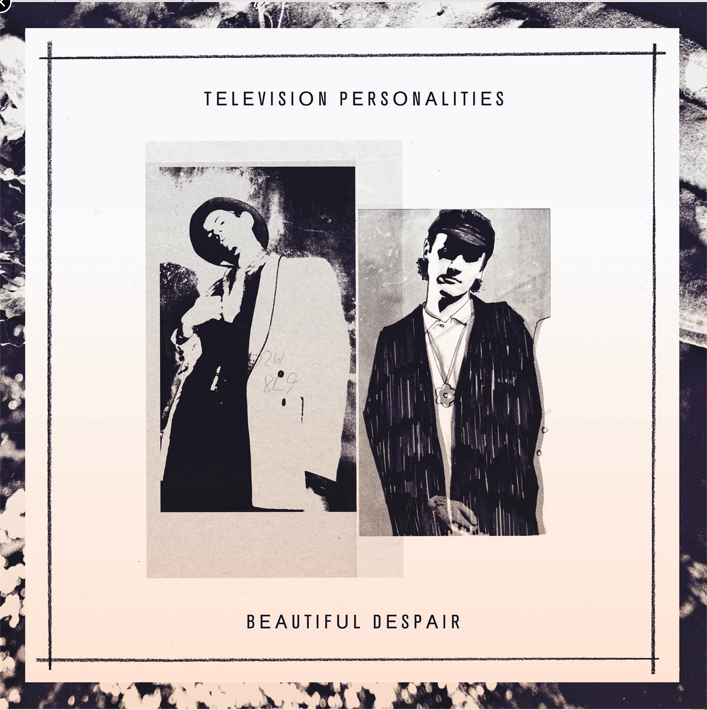
Daniel and Alison are real townies. Hand in hand, they scour the record shops, flea-markets and charity sales. They know the markets well, and rarely go out without coming across people they know. They never miss a pop-art exhibition and go to the La Scala cinema. Swinging London belongs to the past, but London still vibrates to the rhythm of pop and culture. Their world is full of friends and relations who work in the sphere of the press, music, art: failed intellectuals, booksellers, former or future members of the band. There’s Jowe Head of course, but also Ed Ball who is never far away. Alison avoids certain Television Personalities’ fans who gravitate around Daniel and share bad habits with him. Over time, Daniel has become used to not being successful, and to his position as an outsider, revered by “those in the know”. He can see the admiration in their eyes and takes a certain pride in it, which more often than not, he drowns in self-depreciation and alcohol. Between 1988 and 1995, Alison and Daniel’s life is more a romantic than a bohemian one. Money is short, but the couple live modestly and feed on culture. When they’re not going out, they eat a TV dinner off a tray. Daniel is now a vegetarian. He likes to joke and make love in the afternoon. He’s a shy man but he explores his lover’s body with the same serious attention as when he plays the guitar. Daniel is an intelligent man. He likes to stay in the background and do things discreetly, which is obviously a far cry from his exposed position as a singer. But his opinions are sound and often biting. He has a lively political awareness. He likes to support his friends, is generous and a brilliant imitator of singers or public figures.
In the strange life-cycle of the Television Personalities, everything isn’t hunky-dory in those years. The songs bear witness to the presence of spectres, of shadows that take possession of the singer and cloud his mind. But the darkness has ebbed, and love keeps it at bay. Alison and Daniel’s flat is like a sanctuary, a bulwark against doubt and evil. The exclusive relationship which he has with the young woman is what keeps him whole, keeps him together, prevents him from sinking and giving in to his self-destructive bent.
If someone loves you, it means that you are loveable, whatever you may think. We are all what others see in us. You don’t need to be a great philosopher to know that. Life is good, but not for long. These eight romantic years would be a storehouse of happy images, of memories and regrets for the years to come.
This is an excerpt from the forthcoming book Dreamworld Or: the fabulous life of Dan Treacy and his band The Television Personalities written by Benjamin Berton. © Ventil Verlag UG (haftungsbeschränkt) & Co. KG, Mainz, 2022.
